WEDGEHUT FOODS LTD

CEO Wanjiru Mambo highlights how the company is capitallizing on opportunities in Kenya’s potato value chain
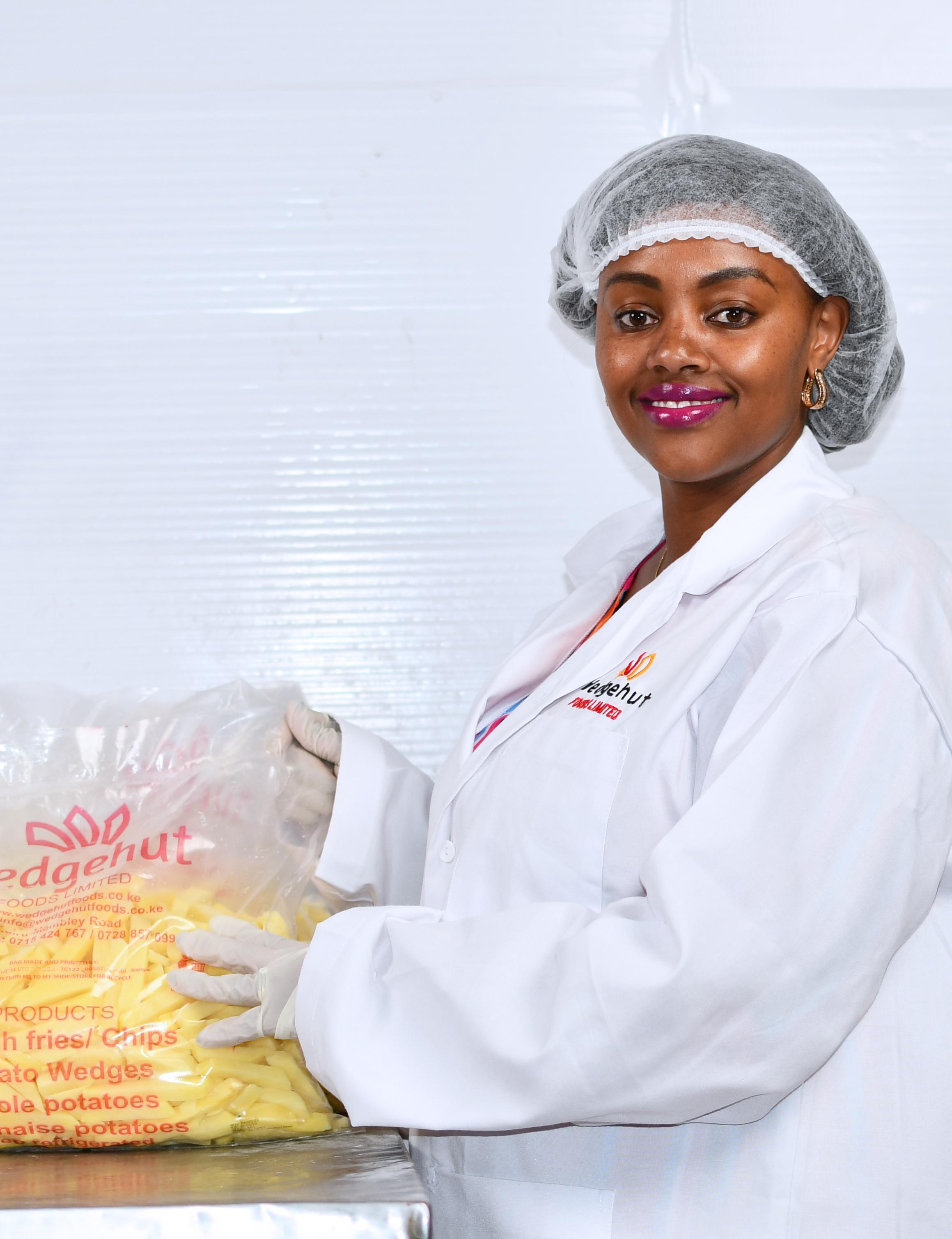
UNLOCKING VALUE OF INFORMAL DAIRY
MITIGATING INFLATION IN AFRICA SOFT DRINKS MARKET
SOFT BEVERAGE INDUSTRY IN TANZANIA
NUTRITION FOR SLEEP
Discover Fi Africa

Where the tastemakers of the world create a world of taste

28-30 May 2023
Egypt International Exhibition Center
figlobal.com/africa
 JOIN US
JOIN US
32 New Product Innovations:
African Originals: Apple & lime Cider | Copia

Global: Pulses | Tanzania Distilleries: Konyagi
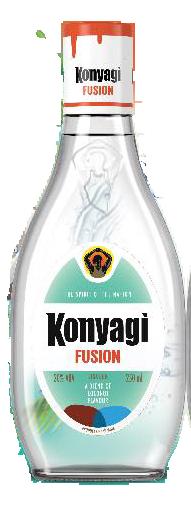
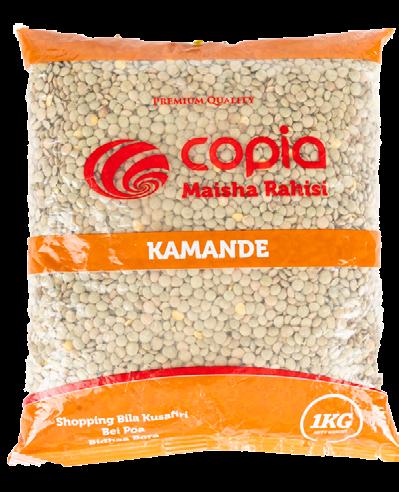

Fusion | Zangibrands: Trail Mix & Breakfast Cereal | Highland Drinks: Club Lemonade | TruFoods


Limited: No-Added sugar Jams

DAIRY BUSINESS AFRICA
42 How Zaidi uses technology to improve incomes of smallholder dairy farmers in Kenya
BEVERAGE TECH AFRICA
45 Manufacturer strategies to mitigate inflation in African soft drinks market
FOOD NUTRITION & HEALTH
55 How the food industry is innovating to create foods that help consumers sleep better

REGULARS
4 Editorial
6 Events Calendar
30 Appointments Update
10 News Updates:
• Uganda Alcohol Industry Association launches alcohol sale and drinking code of conduct
• Traditional recipes will propel food and beverage innovations in 2023: Kerry Taste and Nutrition charts
• Duck Donuts opens Africa’s first outlet in Egypt
• Lancet report terms infant formula milk marketing techniques as exploitative and misleading

• The UK govt invests US$18.5M in Kenya’s first processing facility for Irish and sweet potatoes
• Atlantis Foods acquires fish and seafood distributor Snoek Wholesalers
• Saudi dairy giant Almarai buys out PepsiCo from dairy and juice venture
• Study questions the suitability of cartons as primary packages for milk
• Bill Gates snaps up 3.7% stake in Dutch brewing giant Heineken for US$939m
• No- and low-alcohol category value exceeds US$11bn in 2022, projected to have 7% growth by 2026: IWSR
60 Supplier News & Innovations:
• ADM invests in new US$30 facility in Spain to meet growing demand for probiotics
• Tate & Lyle PLC rebrands business to become purpose-led and growth-focused
• Ingredients specialist Loryma launches Wheat-based binder to optimize meat processing
• Döhler taps DKSH to distribute its texturant solutions in Swizerland and Austria
• Palsgaard pumps US$19.2m in expanding Dutch specialty ingredient facility
• Kerry forges new partnerships with Azelis, Caldic to bolster distribution in Europe
• Alland & Robert unveils acacia gum-based ingredient to replace gelatin and pectins

• Azelis adds smoke ingredients to its portfolio with Smoky Light acquisition
• Chr. Hansen operationalizes South Africa office to enhance service delivery to customers




Food Africa Business
FOUNDER & PUBLISHER
Francis Juma
SENIOR EDITOR
Paul Ongeto
EDITOR
Abel Ndeda
ASSOCIATE EDITOR
Queen Mwasere
BUSINESS DEVELOPMENT DIRECTOR
Virginia Nyoro
BUSINESS DEVELOPMENT ASSOCIATE
Hellen Mucheru
HEAD OF DESIGN
Clare Ngode
VIDEO & DESIGN ASSISTANT
Newton Lemein
ACCOUNTS
Jonah Sambai
PUBLISHED BY: FW Africa

P.O. Box 1874-00621, Nairobi Kenya
Tel: +254 20 8155022, +254725 343932
Email: info@fwafrica.net
Company Website: www.fwafrica.net
Food industry makes progress in gender diversity, but challenges still abound
The food industry globally has made progressive changes in recent years, particularly when it comes to promoting gender splits in the workforce. According to GlobalData, Mondelez, General Mills, Hershey, Kraft Heinz, and Danone were among the food companies with “significant women representation” in their workforce in 2021. Closer home in Africa, leading companies from East African Breweries to Coca-Cola Beverages Africa have all made deliberate efforts towards increasing women participation in the food industry.
EABL has several successful diversity and inclusion programs, including the Spirited Women program for female employees' career development, a STEM Apprentice program to increase gender representation in the manufacturing sector, and a Commercial Graduate program that provides handson experience in commerce fields for female professionals. The efforts are paying off. In 2022, represented 66% of the EABL Group’s Management Team.
women empowerment initiative. In 2022 alone, CCBA empowered more than 17,000 women with foundational business skills, coaching, and support, according to Tshidi Ramogase, CCBA Director Public Affairs, Communications, & Sustainability.
As a way to celebrate the progress made by the food industry, the 56th issue of Food Business Africa features Wedgehut Foods Limited, a fast-rising food processing company in Kenya’s capital Nairobi that is led by a woman by the name Wanjiru Mambo. Starting at the height of the pandemic, the company has defied all odds to establish a name for itself in Kenya’s potato value chain. Read the full story on page 38.
Elsewhere in the magazine, we highlight how technology can be use to maximise the potential of Kenya’s informal diary industry. With sleep becoming a major issue globally, this issue also explores how the food industry is innovating products to help consumers snooze better.
Food Business Africa (ISSN 2307-3535) is published 6 times a year by FW Africa. Reproduction of the whole or any part of the contents without written permission from the editor is prohibited. All information is published in good faith. While care is taken to prevent inaccuracies, the publishers accept no liability for any errors or omissions or for the consequences of any action taken on the basis of information published.

CCBA takes a more wholistic approach to gender diversty. while it has a significant proportion of women in its workforce, the company has invested heavily in empowerment programs that are aimed at supporting women to establish and expand businesses in the food value chain. About 2 million women in Africa have so far been equipped to succeed as entrepreneurs through Coca-Cola System’s 5by20
With these and many more articles on the latest news and trends in the food industry, this issue like its predecessors is definitely a must read
We wish you nothing but an insightful, inspirational and enjoyable reading journey.
Paul Ongeto, Senior Editor FW Africa
Foodex Manufacturing Solutions
24 - 26 April 2023
NEC, Birmingham, UK www.foodex.co.uk
Global Dubai Tea Forum
25 - 27 April 2023
Dubai Marina, Dubai, UAE
https://www.globaldubaiteaforum.ae/

The Future of Food Europe
03 - 04 May 2023


Hotel Casa Amsterdam, Amsterdam, Netherlands
www.eitfood.eu/projects/future-offood-conference
Contract Manufacturing & Private Label Expo
04 - 05 May 2023
Jio World Convention Centre, Mumbai, India www.cmplexpo.com
IFU Juice Conference 2023
08 - 11 May 2023
Lord Charles Hotel, Cape Town, South Africa
www.ifu-fruitjuice.com
Sugar Summit
08 - 10 May 2023
Le Meridien Dubai Hotel & Conference Center, Dubai, UAE www.sugarsummit.in
Food For Future Summit & Expo
10 - 12 May 2023
Dubai World Trade Centre, Dubai, UAE
www.foodforfuturesummit.com
Nigeria International Meat Tech Expo
16 - 18 May 2023
International conference center, Ibadan, Nigeria
https://nipoliexpo.com.ng/nimeatech/

Cold Chain Show
19 - 21 May 2023
Sector 34 Fair Ground, Chandigarh,
India
https://coldchianshows.com/
FNB Ingredients Expo
25 - 27 May 2023
Dussehra Maidan, Indore, India
www.fnbexpo.biz
Africa Food Manufacturing
28 - 30 May 2023
Egypt International Exhibition Center, Cairo, Egypt
www.africa-foodmanufacturing.com/
ProPak MENA
28 - 30 May 2023
Egypt International Exhibition Center, Cairo, Egypt
www.propakmena.com
Saudi Food Expo
05 - 08 June 2023
Riyadh front expo, Riyadh, Saudi Arabia
www.saudifoodexpo.com
World Conference on Food and Beverages
05 - 06 June 2023
London, UK
www.foodandbeverages. foodtechconferences.com
Agrofood Ethiopia
08 - 10 June 2023
Millennium Hall, Addis Ababa, Ethiopia
www.agrofood-ethiopia.com
Food & Beverage West Africa
13 - 15 June 2023
Landmark Centre, Lagos, Nigeria
www.fab-westafrica.com
Foodpack East Africa
15 - 17 June 2023
UMA Show Ground, Kampala, Uganda
www.mxmexhibitions.com/foodpackuganda/
Africa's Big 7
18 - 20 June 2023
Gallagher Convention Centre, Johannesburg, South Africa
www.africabig7.com
Africa Sustainability Symposium
June 13-14, 2023
Safari Park Hotel, Nairobi, Kenya
www.africasustainabilitysymposium. com
AFMASS Food Expo:
June 15-17, 2023
Sarit Expo Centre, Nairobi, Kenya
www.afmass.com/
Africa Food Safety & Nutrition Summit
June 15-17, 2023
Sarit Expo Centre, Nairobi, Kenya
www.summit.foodsafetyafrica.net
Grainstech Africa - International Exhibition & Conference
15 - 17 June 2023
Kenyatta International Convention Centre, Nairobi, Kenya.
www.graintechafrica.com/



International Food Show Africa
20 - 23 June 2023
Le Kram - Exhibition and International Trade Center of Tunis, Carthage, Tunisia
www.ifsaafrica.com/
World Congress on Nutrition and Food Chemistry
05 - 06 Jun 2023
Park Inn by Radisson London Heathrow, London, UK
www.nutrition-foodchemistry. insightconferences.com

Food & Drink Trends & Innovations Conference
07 Jun 2023
London, UK
www.foodanddrinkconference.com/
Safari Park Hotel, Nairobi, Kenya
AFRICA’S MOST INFLUENTIAL FOOD INDUSTRY AWARDS




The Future of Food in Africa

www.afmass.com
JUNE 15-17, 2023
Sarit Expo Centre, Nairobi, Kenya
SIGN UP TO ATTEND EASTERN AFRICA'S LARGEST FOOD, BEVERAGE & MILLING INDUSTRY TRADE SHOW
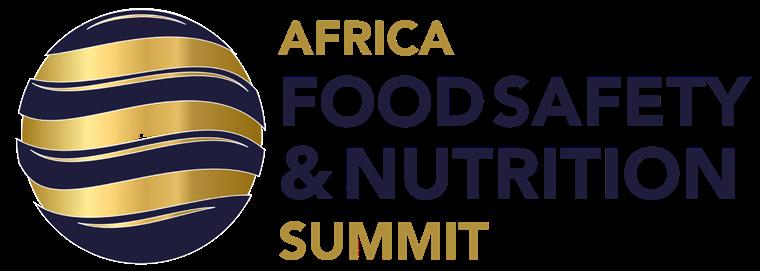
Co-located with:
Sign up today to Sponsor, Exhibit, Speak or Attend AFMASS Food Expo
Hosted at the Sarit Expo Centre in Nairobi, Kenya on June 15-17, 2023, AFMASS Food Expo has over the last 7 years grown into the most influential trade show for the food, beverage and milling industry in Eastern Africa.
This year, look forward to a larger Expo Hall with more exhibitors, a larger variety of exhibitors from more than 20 countries and more food companies showcasing their latest products
And to cap it all, join us as we debut the AFMASS Baking Championship at the Expo. See you in June!!
AFMASS BakingChampionship

• The AFMASS Baking Championship is a new initiative by the organisers of the AFMASS Food Expo that is focused on promoting excellence in the bakery industry in Africa.

• The Championship’s main goal is the advancement of the baking and baking profession in Africa and to create vibe and celebration at this pan-African Expo.
• In the first edition, the Championship will focus on the cake making and decoration – where creativity, science and art converge, thereby enabling attendees to experience the wonderful art of baking.

The competitors will be judged by a Panel of Judges with vast experience in the field of pastry, cake making and baking, with each entry evaluated on originality and creativity in the use of ingredients, decoration and the use of technical skills. They will also be judged on cleanliness and overall presentation of the final cake.
FOUR PAVILLIONS THAT COVER THE FOOD INDUSTRY FROM A-Z
FOOD


FOOD AFMASS DRINKS
MARKET
Duck Donuts opens Africa’s first outlet in Egypt
EGYPT – American coffee and donut distribution chain, Duck Donuts has opened its first outlet in Cairo, Egypt as part of its international expansion drive.
Based at the Cairo Festival City Mall, the new store is going to be managed by Master Foods, a local operator in the catering sector.
The nearly 1,100 sq. ft. store also offers a viewing area where children and adults can watch their donuts being made and photo opportunities throughout with the brand’s iconic
Delta Corporation outlines US$50m
ZIMBABWE – Delta Corporation, Zimbabwe’s largest beverage company, is planning to invest up to US$50 million to strengthen its operations, Group chief executive officer Valela Matlhogonolo has revealed in an interview with businessdigest.

“The current focus of the business is to invest in capacity in the existing

and lovable duck mascot, Ollie.
In addition to donuts, the Cairo location also serves high-end coffee, espresso, donut sundaes, breakfast sandwiches, milkshakes, frozen beverages, select retail items, and more.
The chain further plans to expand in the country by opening 24 additional outlets by 2027, including a new one to be launched in the second half of 2023.

annual investment strategy
businesses, at an average of US$40 million to US$50 million a year,” Matlhogonolo said.
“This includes plant replacements, delivery fleet, information communication technology upgrades, and returnable containers.”
The CEO further noted that regional expansion of the business will be guided by the performance of
the already acquired businesses in the last three years. “We will assess opportunities as they arise.”
The new investments will also touch on supporting farmers contracted to produce raw materials like barley, sorghum, and maize to build reserves to self-sustain the business.
Atlantis Foods acquires fish and seafood distributor Snoek Wholesalers
distribution company has acquired Snoek Wholesalers a major player in the distribution of fish and seafood products to the wholesale and retail trade in the country.

The deal is part of Atlantis Foods’ strategy to grow its business operations and considerably increase its revenue.
Snoek Wholesalers was founded in 1964, as a smoked snoek processing company but currently, processes and markets a wide variety of seafood
products either fresh, dried, smoked or frozen.
Neil Pascall, Managing Director at Atlantis Foods said, “The acquisition of Snoek Wholesales is the next step in our expansion plan and complements our business perfectly.”
Atlantis was founded in 2003 and has amassed immense growth over the years as it currently supplies a broad range of seafood to wholesalers, food service customers and other major stakeholders in the retail industry.
TWO-STEP MOLDING CAN HELP YOU ACHIEVE:


up to 20% Lower package part cost up to 20% Minimized package weight up to 9% Improved uptime Reduce initial CAPEX







Saudi dairy giant Almarai buys out PepsiCo from dairy and juice venture
SAUDI ARABIA – Almarai, a Saudi manufacturer and distributor of food and beverages, has become the sole owner of International Dairy and Juice Limited (IDJ) after buying out its joint venture partner PepsiCo.

Almarai bought PepsiCo’s 48% stake in IDJ for SAR255 million (US$68M) to allow it to “further expand strategically in the wider region”
Riyadh-headquartered Almarai said the deal, announced in a stock exchange filing on Friday (17 February), would allow it to “further expand strategically in the wider region”.
IDJ manufactures and distributes food and beverages in Egypt and Jordan, as well as exports outside those two markets.
New KCC requests state for US$23M to implement milk powder reserve fund
KENYA – The New Kenya Cooperative Creameries (NKCC) has asked the Kenyan parliament to allocate KES3 billion (US$23.9M) for the implementation of a milk powder reserve fund for the stabilization of prices during glut and deficit.
dairy processors in the country and has a range of dairy products including milk, yoghurt, butter, cheese, ghee and cream milk powder.
NKCC said the Strategic Milk Powder Fund was established in law in 2016 and will be used for mopping up excess milk when there is glut, converting excess into milk powder and for release into the market when there is a shortage.
The company further communicated to the National Assembly’s Trade, Industry and Cooperatives that it would need KES500 million as initial seed capital to complete the modernization and upgrade of milk processing equipment.
Its JV with PepsiCo was formed in 2009 to focus on opportunities in south-east Asia, Africa and the Middle East, excluding the Gulf Cooperation Council countries where Almarai already had a strong presence.
Later that year, IDJ bought a 75% stake in Jordanian dairy producer Teeba and in 2010 acquired Egypt milk, juice and yoghurt producer Beyti.
New KCC is state-owned milk processor engaged in the processing and marketing of milk and milk products in the country.
The company is one of the largest
The government had recently spent KES 2 billion to modernize some of the New Kenya Cooperative Creameries factories in seven counties to build capacity for dairy farmers.
The factories situated in Uasin Gishu, Bomet, Nyahururu, Nyeri, Trans Nzoia, Meru and Mombasa have been revamped to build capacity for dairy farmers.

KCC HAS FURTHER REQUESTED FOR KES500 MILLION AS INITIAL SEED CAPITAL TO COMPLETE THE MODERNIZATION AND UPGRADE OF MILK PROCESSING EQUIPMENT.






BGI Ethiopia invests US$9.3m in expanding Meto Abo Brewery
ETHIOPIA – Brasseries et Glacières Internationales (BGI), a subsidiary of the French beverages firm Castel Group, has pumped Birr 500 million (US$9.3 million) into its Meto Abo Brewery to remodel and expand the brewery.
Until last year, Meta Abo brewery was under the ownership of British drinks giant Diageo which had acquired it in 2012 from the Ethiopian government for US$225 million.
While under the ownership of Diageo, the brewery got a boost of US$119 million in investment to expand its bottling line.
The investments by BGI will see the brewery fitted with new types of machinery and generators, which are expected to increase production capacity and strengthen BGI’s position in the market.
Uganda Alcohol Industry Association launches alcohol sale and drinking code of conduct
BGI, has a significant market share in the Ethiopian beer market, and also exports products across Africa, Europe, Asia, Australia, and North America.
Apart from Meto Abo Brewery, the group also owns other breweries in the area including St. George Brewery; Zebidar Brewery; Hawassa Brewery; Kombolcha Brewery, and Maychew Northern Brewery.

UGANDA – Alcoholic beverage players under their umbrella body, the Uganda Alcohol Industry Association (UAIA), have launched the code of conduct that will guide the sale and consumption of alcohol all over the country.

The UAIA chairman, Onapito Ekomoloit, said the code will help address social issues such as drinking and driving, underage drinking, and heavy episodic drinking all aimed at promoting the responsible use of alcoholic beverages.
He, however, noted that the code does not serve to summarize or substitute national laws and policies, which must always be upheld but rather explains UAIA’s approach to self-regulation.
According to the code of conduct by alcohol manufacturers, all members of UAIA must only portray drinking in safe and appropriate circumstances.
In addition, those marketing alcohol should not imply that drinking enhances virility, mental ability or performance, skills, or strength and neither should they use suggesting drink names that imply energizing, stimulating, or invigorating properties.
In the case of co-promoting alcoholic brands with energy drinks,
the mixer must be treated neutrally just like any other mixer, no energy claims should be made, and particular care must be taken with the imagery used.
With this code, penal sanctions have been put in place for noncompliant members and there will be a committee constituted to monitor and oversee the implementation.
ACCORDING TO THE CODE, THE
According to the code, the committee may issue the offer with a caution or impose a fine not exceeding shs10 million (US$2,715).
COMMITTEE MAY ISSUE THE OFFENDER WITH A CAUTION OR IMPOSE A FINE NOT EXCEEDING UGX10 MILLION TO NON COMPLIANT MEMBERS.



































































USA - Scientists from the North Carolina State University carried out a test analysis that offers insights into how some packaging materials impact the sensory and chemical properties of milk, which was published in the Journal of Dairy Science.
The varieties of packages were glass, LDPE (low-density polyethylene), HDPE (high-density polyethylene), PET (polyethylene terephthalate), LLDPE (linear lowdensity polyethylene) and paperboard carton.
According to the study report, glass bottles are the most advisable package as they retain the milk flavour, are more environmentally friendly and are considered more hygienic.
Milk packaged in paperboard cartons and LLDPE packages was found to have ‘lower cooked and sweet aromatic flavours with storage time and distinct stale flavours’ compared to milk stored in PET, HDPE and LDPE containers.

The paperboard-packaged milk was also reported to have a stronger ‘paper taste’ within hours of storage.
As for chemical transfer, milk packaged in paperboard and plastic bags also had higher amounts of chemical compounds after days of storage.
The UK govt invests US$18.5M in Kenya’s first processing facility for Irish and sweet potatoes
KENYA-The UK government has launched the construction of a KES2.3 billion (US$18.5M) production facility for Irish and sweet potato processing in Iten town of Elgeyo Marakwet county, Kenya.
The factory is a partnership between the UK government and Select Fresh Produce Kenya Limited which is implemented through the UK’s Sustainable Urban Economic Development Programme (SUED) in collaboration with the Iten municipality.
The processing factory will have a capacity of 60,000 tonnes, anticipated to process fresh and frozen Irish and sweet potatoes.
If completed, the factory will be the first in the country and the third in
INVESTMENT SUSTAINABILITY
Africa after Egypt and South Africa to process Irish and sweet potatoes for the European market.
Speaking at its launch, Jane Marriot, the British high commissioner to Kenya said that the factory will guarantee steady farm prices to over 10,000 smallholder potato farmers in the county and the region.
She also added that the facility will create at least 5,000 direct jobs in its first year of operation which will increase to 10,000 jobs within five years.
In addition, the program also intends to be producing a new highyielding seed variety to boost farmers’ yield and income.
PepsiCo Egypt subsidiary opens US$20M chips production line in expansion strategy move
Founded in 1982, Chipsy for Food Industries holds approximately 60% market share in the snack segment in Egypt and exports its products to 11 countries in Africa, Asia, and the Middle East including Saudi Arabia, Kuwait, and Lebanon.
The 110,000 sqm Chipsy Company for Food Industries plant includes nine production lines producing potato chips, tortilla chips, and corn-derived products.

EGYPT – Chipsy Food Industries, a subsidiary of PepsiCo Egypt Group, has opened a new US$20 million production line inside the Chipsy factory with a production capacity of 25,000 tonnes as part of its expansion strategy in the Sixth of October City, Egypt.
According to Mohamed Shelbaya, president of PepsiCo North Africa region, the new investment will facilitate the company’s goal of diversifying in particular into corn and potato-based snacks.
In addition, the investment will contribute to the Egyptian economic drive by employing 45 full-time employees and 145 temporary workers seven days a week.
Study questions the suitability of cartons as primary packages for milk
Planet-first nutrition will dominate consumer habits in 2023: FrieslandCampina consumer trend projections
ageing are among the prominent trends to be expected in the industry.
According to the magazine, consumers are ‘building trust for planet-first nutrition’ with concern for the planet expected to be observed in consumer habits for the foreseeable future.
Consumers are also becoming increasingly skeptical towards sustainability claims made by companies, the report noted.
In its projection, FrieslandCampina highlighted positive nutrition as the second most popular trend for 2023.
unique formats like teas, shots and fortified gummies that contain gutfriendly ingredients like prebiotics.
NETHERLANDS – FrieslandCampina has released its third annual consumer trend magazine, ‘Shaping the future of nutrition’ which highlights current consumer drivers in the food, beverage and supplements industries in 2023.
The ingredient supplier points out that planet-first nutrition and active
Plant-based and alternative proteins take third position in the ranking driven by a desire for highquality and nutritious products that do more than just replace animal proteins.
On fourth position is gut health driven by growing consumer awareness concerning gut health and gut microbes which support mental health and reduce stress. The company predicts the emergence of
Friesland’s fifth trend for 2023 is a shift from the emphasis on “healthy ageing” to “active ageing” which will offer opportunities for brands to develop products that support mobility and balance targeting emerging markets in adult nutrition.

Inyange Industries readies US$45M milk processing plant for commissioning
RWANDA – Inyange Industries
Limited, Rwanda’s leading agroprocessing firm has announced plans to commission a US$45 million milk processing unit in the Nyangatare district.
The new factory is anticipated to begin operations in May 2023 and will have the capacity to process 650,000 litres of milk in liquid form into 50,000 kilogrammes of milk powder a day.

The site intends to supply the produced 50 tonnes of milk powder along with 150,000 litres of UHTtreated milk every day, according to James Biseruka, Inyange Industries
According to information from the Ministry of Agriculture and Animal Resources, the plant’s marketing plan includes securing an off-take contract from Africa Improved Foods (AIF), a local major food manufacturer, for 2,000 tonnes of milk annually.
However, only 20% of the factory’s production will be domestically supplied while the remaining 80% is intended for exportation to the countries of the East African Community (EAC), the East African Common Market and Southern (COMESA) and the Middle East.
THERE IS A SHIFT FROM THE EMPHASIS ON HEALTHY AGEING TO ACTIVE AGEING WHICH OFFERS OPPORTUNITIES FOR BRANDS TO DEVELOP PRODUCTS THAT SUPPORT MOBILITY.





































 YEMISI IRANLOYE Founder/CEO, Psaltry International
MICHAEL CHORSKE Operating Partner, Pegasus Capital Advisors / Sustainable African Foods, Mali
JOHN MWENDWA Public Affairs & Communications Director, Coca-Cola Beverages Africa
DAVID KAMAU Managing Director, Fortified Whole Grain Alliance
NDIDI NWUNELI Executive Chairman, Sahel Consulting & Co-Founder, AACE Foods
DAVE OKECH OKECH Founder & Chief Imagination Officer, Aquarech
MATTHIAS GRABE Managing Director, Buhler East Africa
HARRISON JUMA General Manager, Tunga Nutrition (Unga Group)
TUMISANG MATSHEKA Vice President, Supply Chain, PepsiCo South Africa
STANLEY MWORIA CEO, Aquaculture Association of Kenya
PAUL BARTELS CEO, Mogale Meat
CAROL KOECH Country President, Schneider Electric East Africa
CLAIRE VAN ENK CEO, Farm to Feed
JIT BHATTACHARYA Co-founder & CEO – BasiGo
MICHAEL ORANGI Country Director, Kenya & Tanzania, Rainforest Alliance
WILLIAM KAPFUPI Managing Executive, CCB, National Foods
TALASH HUIJBERS CEO & Founder, Insectipro
JOACHIM WESTERWELD Executive Chairman, Bio Food Products
VAISHALI MALDE Sales & Marketing & Sustainability Manager, PIL
CAESAR ASIYO Chief Development Officer, Victory Farms
DR. KEN MUMA CEO, AAR Hospital
YEMISI IRANLOYE Founder/CEO, Psaltry International
MICHAEL CHORSKE Operating Partner, Pegasus Capital Advisors / Sustainable African Foods, Mali
JOHN MWENDWA Public Affairs & Communications Director, Coca-Cola Beverages Africa
DAVID KAMAU Managing Director, Fortified Whole Grain Alliance
NDIDI NWUNELI Executive Chairman, Sahel Consulting & Co-Founder, AACE Foods
DAVE OKECH OKECH Founder & Chief Imagination Officer, Aquarech
MATTHIAS GRABE Managing Director, Buhler East Africa
HARRISON JUMA General Manager, Tunga Nutrition (Unga Group)
TUMISANG MATSHEKA Vice President, Supply Chain, PepsiCo South Africa
STANLEY MWORIA CEO, Aquaculture Association of Kenya
PAUL BARTELS CEO, Mogale Meat
CAROL KOECH Country President, Schneider Electric East Africa
CLAIRE VAN ENK CEO, Farm to Feed
JIT BHATTACHARYA Co-founder & CEO – BasiGo
MICHAEL ORANGI Country Director, Kenya & Tanzania, Rainforest Alliance
WILLIAM KAPFUPI Managing Executive, CCB, National Foods
TALASH HUIJBERS CEO & Founder, Insectipro
JOACHIM WESTERWELD Executive Chairman, Bio Food Products
VAISHALI MALDE Sales & Marketing & Sustainability Manager, PIL
CAESAR ASIYO Chief Development Officer, Victory Farms
DR. KEN MUMA CEO, AAR Hospital
Bill Gates snaps up 3.7% stake in Dutch brewing giant Heineken for US$939m
NETHERLANDS – Billionaire entrepreneur and Microsoft cofounder, Bill Gates, has purchased a 3.7% stake (10.8 million shares) worth about US$939.87 million in the Dutch brewing group, Heineken.

“Of the 10.83 million shares, Bill Gates bought 6.65 million as a private individual and another 4.18 million through the non-profit Bill & Melinda Gates Investment Trust, a foundation owned by the American business
magnate and his ex-wife,” Inside Beer reported.
Gates purchased the shares from
the Mexican Coca-Cola bottler and convenience store operator Fomento Economico Mexicano SAB(FEMSA), which is exiting the brewing business to focus on core business verticals.
According to Bloomberg, FEMSA plans on selling all its shares in Heineken within two to three years.
In a separate filing, Heineken said it bought €1 billion (US$1 billion) worth of shares from the exiting shareholder, FEMSA.
No- and low-alcohol category value exceeds US$11bn in 2022, projected to have 7% growth by 2026: IWSR
stages and have a small volume base.
IWSR expects no-alcohol volumes to grow at a compound annual growth rate (CAGR) of +9% between 2022 and 2026. The growth is attributed to improved taste, production techniques, and diversification of consumption occasions.
GLOBAL – Sales of no- and lowalcohol drinks globally surpassed US$11 billion in 2022, up from $8 billion in 2018, according to new data from global alcoholic market research firm IWSR.
The category grew by more than 7% in volume across 10 key global markets in 2022, driven by increasing consumer demand.
The global alcoholic market research firm highlights that the pace of growth is further expected to surpass that of the last 4 years, with a forecast volume CAGR of +7%, 2022-
2026, compared to +5%, 2018-2022.
The No-alcohol drinks will lead the growth, accounting for over 90% of the forecast total category volume growth.
In 2022, No-alcohol volumes grew 9%, increasing their share of the overall no/low-alcohol space in the world’s 10 leading no/low markets to 70% up from 65% in 2018.
The subcategory is said to be growing faster than low alcohol in most markets, with the exemption of countries like Japan and Brazil, where low-alcohol markets are at early
The market research firm further forecasts consumption of no/lowalcohol beverages to grow by a third by 2026, spearheaded by the growth of no-alcohol products.

IN 2022, NO-ALCOHOL VOLUMES GREW 9%, INCREASING THEIR SHARE OF THE NO/ LOW-ALCOHOL SPACE IN THE WORLD'S 10 LEADING NO/LOW MARKETS TO 70% UP FROM 65% IN 2018.







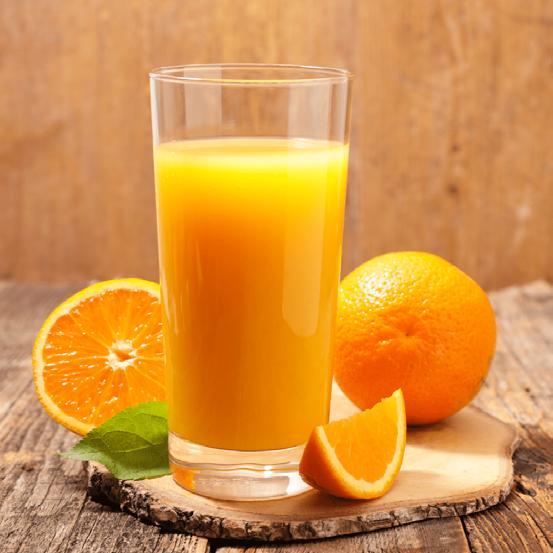
Brewdog ties up with Budweiser to launch iconic craft beer brands in China

CHINA - UK-based craft beer maker Brewdog is expanding in China after partnering with brewing giant Budweiser.
The joint venture with Budweiser China will see the Scottish firm's Punk IPA and other beers brewed in China.
Brewdog also says it plans to open more bars in the world's second largest economy.
It comes after the company has faced controversies in recent years and has flagged it may pursue a stock market listing.
In a statement, Brewdog founder James Watt described the Budweiser partnership as "transformational" and said it would bring the craft brewery to "every corner of the world's biggest beer market".
REGULATORY
Pause on sugar tax increment a welcome relief to South
African sugar producers
SOUTH AFRICA – South Africa has paused further on the Health Promotion Levy (HPL), otherwise known as the sugar tax for two years in an effort to shield the industry from collapse.
The announcement from the Minister of Finance, Enoch Godongwana, during the presentation of the 2023 national budget is a muchwelcome relief to players in the sector.
In making this decision, the government took into account challenges stemming from greater regional competitiveness, the damage incurred from the floods in April 2022 and civil unrest in July 2021.
It follows persistent requests from players in the sugar industry such as the Sugar Association of South Africa and the South African Cane Crowers’ Association, who said that an increase in the levy would prove detrimental to the already struggling industry.

According to the South Africa Sugar Association, the increase in the sugar tax would have led to the loss of
more than 6000 jobs and jeopardized nearly 3000 small-scale grower businesses.
SA growers also compiled some data whose findings revealed that farmers already expect to lose about R700 million (US$ 38M) in 2023 owing to the implementation of loadshedding at stages 4 to 6.
Kenya’s leading coffee chain Java House Africa refutes claims that it is being sold
Under the deal, Brewdog said it expects its beers would begin to be produced at Budweiser China's Putian craft brewery, in the southeastern province of Fujian, by the end of next month.
The company said it also plans to open several bars in the country in the next three years.
China, which is the world's biggest market for beer, currently accounts for less than 1% of Brewdog's overall sales.
KENYA – Java House Africa, one of the leading coffee houses in East Africa, has refuted claims that its owner, UK-based private equity fund Actis is looking for potential buyers for the business estimated to be worth between Sh2.5 billion (US$18.4m) and Sh3 billion (US$24m).
The speculations into the sale have been going on for weeks now with many media houses quoting persons familiar with the transactions.
Mauritius-based private equity firm Adenia Partners had been identified as one of the potential buyers with
“sources familiar with the matter” intimating that talks were at an advanced stage.
In a LinkedIn Post, Java House Africa, which operates over 80 stores in 3 countries and across 12 East African cities, distanced itself from the said reports.
“There have been a number of misleading articles in the press recently speculating that Java might be for sale. These are absolutely incorrect. There is no sale process and there are no offers on the table,” read the LinkedIn post.
Zimbabwe cuts reliance on dairy imports as local production surpasses
91M litres
ZIMBABWE – Efforts towards dairy self-sufficiency in Zimbabwe have started bearing fruits with local production rising to 91.4 million litres in 2022 from 79.6 million in the year prior.
The higher milk output comes from a growing national herd population which has grown to 39,000 heads of cattle.
This growth has been attributed to the government’s multiple
ZIMBABWE NOW WANTS TO INCREASE THE UPTAKE OF RAW MILY BY PROCESSING COMPANIES FROM THE CURRENT LEVEL OF 70M LITRES TO 130 MILLION LITRES PER ANNUM BY 2025.
initiatives as revealed by the Lands, Agriculture, Fisheries, Water and Rural Development permanent secretary Dr John Basera.
The spike in local production has caused a 17% drop in milk powder imports from 8.9 million kgs in 2021 to 7.4 million kgs in 2022, according to Dr Basera.
With increased production, Zimbabwe now wants to increase the uptake of raw milk by processing companies from the current level of 70 million litres to 130 million per annum by 2025, according to Finance and

economic development Minister Prof. Mthuli Ncube.
To achieve this goal, Prof Mthuli urged dairy processors to increase their uptake of raw milk from smallholder farmers and increase their support to out-grower schemes so as to help build the stock of the dairy herd.
In line with that, the government has also proposed to gradually reduce milk powder and cheese imports in a sliding scale manner starting at 75% in 2023 to 50% in 2024 and 25% in 2025.
Tanzania partners with Spanish fishing company to build US$10M fish processing factory

TANZANIA – The Deep-Sea Fishing Authority (DFSA) of Tanzania in collaboration with a Spain deep sea fishing company anticipates building a TZS23.4 billion (US$10 M) fish processing factory in Tanga.
The Spain fishing company in question is called Pacific Star and it was recently granted a license for its vessels to practice deep-sea fishing in the Indian Ocean using the Tanzanian flag.
According to the DFSA’s Managing director Dr Emmanuel Sweke, once
fully operational, the factory will have the capacity to process 100-200 tonnes of fish per day and create about 100 job opportunities for the
citizens of Tanzania.
“This Spain fishing company also has been registered in Zanzibar Marine Authority and practicing fishing activities in our Exclusive Economic Zone (EEZ),” Dr. Sweke revealed.
“It is also providing about TZS920million (US$393,667) to the government every year as an economic compensation and it has agreed to employ 10 Tanzanians in their vessel as well as train two Tanzanians in the level of vessel Captains.”
www.summit.foodsafetyafrica.net

JUNE 15-17, 2023
Nairobi, Kenya
DISCOVER THE FUTURE OF FOOD SAFETY, NUTRITION & FOOD SECURITY IN AFRICA
REASONS TO ATTEND THE SUMMIT
Provide a platform to exchange the latest knowledge, experience and expertise in food safety, food nutrition, food processing and new technologies within the food and agro value chains in Africa

Improve local, regional and global collaboration initiatives on food nutrition, food security and food safety initiatives;
Provide a platform where technology and service providers can showcase their latest products and services to the industry, Goverment/NGOs and other stakeholders, hence improving the adoption of the latest technologies in Africa’s food and agro sector;
Improve the quality and food safety aspects of the food, agricultural and processed food and feed products in Africa, hence boosting trade and market access to local, regional and overseas markets;
Amplify the awareness of consumers on food safety, regulatory and public health issues and how each stakeholder can contribute to a safer food environment in the Continent.





Lancet report terms infant formula milk marketing techniques as exploitative and misleading
USA – A recently published report by Lancet has noted that the infant formula industry is using exploitative and “underhand” marketing strategies that are influencing millions of mothers not to breastfeed.
According to the report, misleading marketing tactics used in the infant nutrition industry have created a reality where fewer than half of infants globally are currently being breastfed contrary to WHO recommendations.

Some of the uncanny tactics include the use of influencers, industry-sponsored applications, and use of poor science to suggest that infant products offer solutions to common infant behaviour such as disrupted sleep and persistent crying.
According to the report, uncanny marketing behaviors have propped commercial milk formula market into a US$55 billion market.
Traditional recipes will propel food and beverage innovations in 2023: Kerry Taste and Nutrition charts
According to a global infant formula market report, the market is projected to grow at a CAGR of 4.04% to reach a market size of US$62.066 billion by 2027.
The experts are calling for an urgent strengthening of regulations and an international legal treaty to end irresponsible formula milk marketing and political lobbying.
APMEA – Kerry has released its APMEA 2023 annual Taste and Nutrition Charts highlighting the upcoming and emerging flavors for the coming year, as well as top mainstream and key tastes.
According to the charts, flavors inspired by global cuisines and heirloom recipes will propel food and beverage innovations in 2023.
Old cooking practices are also anticipated to resurface as consumers are seen to place more importance in tradition and provenance.
As a result, Kerry notes that ingredients such as nutmeg, ashwagandha, Indian gooseberry and ancient grains will find a new home across snack and beverage applications.
Soumya Nair, Global Consumer Research and Insights Director at Kerry, said: “Flavours have a powerful way to convey a story – particularly when it comes to consumer trends and preferences.
This year we will witness the resurgence of time-honoured traditions and heirloom recipes as consumers crave traditional tastes with new and emerging flavours.”
Consumers will also be on the look out for unconventional combinations of traditional ingredients and emerging taste profiles from other regions, such as black sesame crusted meats, sriracha-spiced cocktails, green tahini, saffron and curry aioli.
A thirst for healthier beverages with functional ingredients is also expected to reach new heights as more and more consumers move towards functionality and simplicity.

KERRY NOTES THAT INGREDIENTS SUCH AS NUTMEG, ASHWAGANDHA, INDIAN GOOSEBERRY AND ANCIENT GRAINS WILL FIND A NEW HOME ACROSS SNACK AND BEVERAGE APPLICATIONS.
Egypt shuts down facility believed to be producing counterfeit Nescafe coffee products
EGYPT – A company producing counterfeit copies of Nescafe coffee products under the name of food and beverage giant Nestlé has been shut down by law enforcement authorities.

The facility was based in North Cairo and was producing fake nescafe coffee along with other brands while failing to adhere to the appropriate regulations and operating without
a license, according to local media reports.
Along with commercial fraud, rumours have it that the fake coffee packs were filled with ceramic powder which led to the matter being discussed in the national parliament according to a government official.
The rumours were however later debunked by the head of the internal trade sector at the Ministry of Supply, Abdel Moneim Khalil, who said that the factory was seized due to counterfeiting an international brand.
From a raid in the factory, 5 million fake packs branded Nescafe were found together with three tonnes of raw materials.
Coffee has been a common target for food and beverage fraudsters where low-quality coffee beans are ground and adulterated with filler ingredients like corn, wheat, barley, soybeans, and rice among others.
CCBA expands production capacity in Africa, steps up youth and women empowerment
AFRICA – Coca-Cola Beverages
Africa (CCBA) is investing in expanding its production capabilities by installing a new production line at Coca-Cola Beverages Botswana’s (CCBB) Gaborone factory which will help reduce energy consumption, improve productivity, and open up export opportunities to neighboring countries.
According to CCBA, the factory will have state-of-the-art technology that allows for faster and more efficient production of polyethylene phthalate (PET) bottled products, increasing productivity and producing bottles with higher clarity and strength.
Uganda Breweries Limited commissions US$10.73M production line
UGANDA – Uganda Breweries
Limited, a subsidiary of East African Breweries Limited, has commissioned a UGX 39.9 billion (US$10.73 million) production line in an effort to improve capacity and efficiency.

The new line will increase the brewer’s production capacity to 30,000 330ml Bottles Per Hour and 25,000 500ml Bottlers per hour averaging Best – in Class efficiency of 94%, UBL said in a statement.
“The new line which is manned by atleast 65% women will supplement a UGX 44.4 billion state-of-the-art bottling line that was launched in 2010 that doubled the production capacity of the beer bottling plant,” UBL said.
The commissioning was presided over by a delegation from the Ministry of Finance led by the State Minister
The investment follows a US$4 million investment in a new polyethylene phthalate (PET) plastic bottle production line at CCBA’s Nampula factory in Mozambique.
The Nampula plant produces approximately 14,400 bottles of 200ml PET bottles per hour, cutting down on transport costs and CO2 emissions, CCBA said.
10,000 youth in 10 higher education institutions will be enrolled in a digital coaching and mentorship program called Boundless Minds in partnership with CCBA through CocaCola Beverages Uganda (CCBU).
of Finance for General Duties
–Hon. Henry Musasizi assisted by the Kampala Capital City Authority (KCCA) ED Dorothy Kisaka and UBL Board Member Jimmy D. Mugerwa.
“As a 76-year business, this milestone stands as a testament to the fact that our quality Ugandan products – made from quality Ugandan inputs – are well-received in the country and the region,” said Andrew Itambo Kilonzo – UBL’s Managing Director.


WHAT’S ON SHOW AT THE EVENT
Africa & Care Hospitals
Expo
Africa
Medilab
& Expo Diagnostics
Animal
Health & Care
Africa
Expo Devices Medical
Africa
& Health Nutrition
Expo
Wellness
Africa Health
Supply Chain
Africa & Expo Logistics
Expo
Africa Health
Financing & Insurance
Expo
Africa
HealthTech

Expo
Africa
Expo Pharma
APPOINTMENTS Update
Zambeef names Ezekiel Sekele new Executive, Corporate Affairs and Sustainability
Danone South Africa appoints Hervé Barrere as Managing Director

SOUTH AFRICA – Danone South Africa, the country’s largest manufacturer and distributor of yoghurt, has appointed Hervé Orama Barrere as its new Managing Director.
According to Danone, Barrere is no stranger to the African market noting that he possesses rich insights, experience, and on-the-ground knowledge of building brands in Africa.
Tongaat Hullet appoints Dan Marokane as acting CEO

ZAMBIA – Zambeef Products PLC, the largest beef-producing company in Zambia, has appointed Ezekiel Sekele as its Executive of Corporate Affairs and Sustainability.
Sekele brings to Zambeef a wealth of experience gained from over 20 years of expertise in senior management positions across several sectors.
Prior to this appointment, Mr. Sekele served as the Director of Corporate Affairs of Zambian Breweries, which is part of Belgium-based multination brewing giant AB InBev Group.
He was also the immediate past President of the Zambia Association of Manufacturers (ZAM) and has sat on the Zambia Chamber of Commerce and Industry (ZACCI) board.
He has had successful careers in several multinational organizations such as Deloitte & Touche, the Commonwealth Development Company (CDC) at Mpongwe Development Company, and SABMiller Mozambique (CDM).
Mr. Sekele is an associate of the Chartered Governance Professional with a post-qualifying diploma in Corporate Governance.
Barrere previously led Danone Nigeria as Managing Director in 2017 as well as in Algeria in 2019. He has also worked with the Swiss multinational food and drink processing conglomerate corporation Nestlé for 10 years in various positions including managing director in the Congo and Central Africa regions.
SOUTH AFRICA – Tongaat Hulett, South Africa’s biggest sugar group, has appointed Dan Marakone, as acting CEO, following the resignation of Gavin Hudson.
Hudson was appointed four years ago to help lead Tongaat’s turnaround after years of business turmoil where the company was riddled with debt that threatened its survival.
Marakone took office on March 1st and is required to steward the sugar giant through the difficult period by working in hand with the business rescue practitioners who are currently working on a highly anticipated business rescue plan.
His career in Tongaat Hullet started back in 2018 as chief of business transformation officer, part of Hudson’s turnaround team, and then appointed as executive director in 2019.

The company intends to leverage his longevity in the field as well as his wealth of operational and leadership expertise.
With this new appointment, Barrere is tasked with the responsibility to ensure the continued success and growth of Danone South Africa and its full brand portfolio.
He has had a valuable contribution to Tongaat Hulett, notably his impact on the internal cashflow optimization programmes and the management of the company’s asset disposals.
Marakone holds a BSc in Chemical Engineering, an MSc in Petroleum Engineering, and an MBA degree and has worked in various executive roles across mining and manufacturing industries over the past 20 years.
Nile Breweries picks Adu Rando to succeed David Valencia as Country Director
UGANDA – Nile Breweries, the Ugandan subsidiary of alcohol manufacturing giant AB InBev, has appointed Mr. Adu Rando as its new Country Director, replacing David Valencia who takes on the role of Commercial Strategy Director, Africa Zone for AB InBev.
Rando has had over 20 years of service to the Company’s parent company AB InBev in different capacities in Brazil, China, and Tanzania.
In Tanzania based in Dar es Salaam, he served as the Route To Market Director, Greater Africa Tanzania from 2021. He will leave Tanzania for new roles in Uganda.
Appolinaire Djikengm becomes first African to lead the International Livestock Research Institute
Serengeti Breweries Boss Martin Ocitti takes helm at Kenya Breweries Limited

KENYA – East African Breweries Limited (EABL), a subsidiary of alcoholic beverage giant Diageo, has appointed Martin Ocitti to the role of Managing Director of Kenya Breweries Limited (KBL), from 1st March 2023.
Ocitti joined EABL in 2014 as MD for EABL International (EABLI), then moved to Uganda Breweries Limited as its MD in 2016, and later in 2019, he took up the role of MD for Serengeti Breweries, Tanzania.
Martin succeeds John Musunga who left KBL last October to take up a new assignment as the new Managing Director for Guinness Nigeria.
KENYA – Appolinaire Djikengm, A Cameroonian biologist and researcher at the University of Edinburg in Scotland, has become the first African to lead the International Livestock Research Institute (ILRI) following his recent appointment as Director General of the organisation.

The new director will take office in April 2023. The appointment also includes him being the Senior Director of livestock systems of the Consortium of International Agricultural Research Centers (CGIAR).
Martin’s position in Tanzania will be filled by Dr. Obinna Anyalebechi, a seasoned executive with an expansive
His proven track record span across sales, operations, digital sales systems platforms, e-commerce, sales structure, and process optimization.
According to Onapito Ekomoloit, the Legal and Corporate Affairs Director, Rando’s long sales and operations experience in different channels on three large and diverse continents and his unique expertise in driving technological change across markets have provided him with a solid base for his role.

In his new role, Professor Djikengm is expected to expand ILRI’s proven track record of impact, developing livestock sustainable systems that will help nourish and sustain millions of people in low- and middle-income countries. He will also provide leadership and coordination of activities related to livestock systems across CGIAR.
Professor Djikengm is a globally renowned biologist who earned his respect from various scientific research including his piloted multidisciplinary and multi-institutional research and development programs focused on the development of agriculture and livestock health.
experience in commercial, consumer marketing, and customer marketing spanning over 16 years.
Mark has an honours degree in Statistics from Makerere University and an MBA from Herriot Watt University in Scotland. He also has an Executive MBA from London Business School.
AFRICAN ORIGINALS
Apple & lime Cider



Kenya-based craft beverage producer African Originals has just released a new cider: the apple and lime Cider! According to the company, the new KO Coffee Cider is an “authentic Kenyan fruit cider carefully handcrafted with a coffee kick.” The drink is 4.5%ABV and comes packaged in a stylish 330ml bottle unique to the KO range of ciders. Consumers can purchase the cider directly from the company’s website or at select retail stores in Kenya.


www.kenyanoriginals.co.ke
COPIA GLOBAL
Pulses
Copia, a leading online retail platform in Kenya, has added pulses namely green grams, lentils, and black beans to its portfolio of own-label food products. “We are excited to introduce you to our very own Copia Ndengu (green grams), Copia Njahi (black beans) and Copia Kamande (lentils)!,” Copia said. Copia says that its pulses are sourced from Kenyan farmers and has promised to offer buyers “a fantastic launch discount” adding that it will continue to offer free deliveries countrywide through Copia Agents.



www.copiaglobal.com
TANZANIA DISTILLERIES
Konyagi Fusion
Tanzania Distilleries Limited has added two new flavor variants, Ginger & Lemon and Coconut, to its flagship spirit brand Konyagi. Launched under a new brand name Konyagi Fusion, the new flavours were specially tailored to appeal to the modern youth. Konyagi fusion has 20 percent alcohol and is available in 250 milliliters glass packaging that still maintains the classic shape that the Konyagi brand is known for.

www.tanzaniabreweries.co.tz

ZANGIBRANDS Trail Mix & Breakfast Cereal
Zangi Brands has launched Trail Mix (R'eino Notten), a mixture of premium selected nuts and seeds that have been sweetened and roasted to meet a healthy-diet needs. The brand is available in three varieties namely Unflavored, BBQ, Caramel, and Cashew.




The company has also unveiled a ready-to-eat cereal that “comes with the concept of fulfilling customer needs: no artificial sugar, rich & nutritious.” The breakfast cereal is available in different varietie including zangigranolla; Nutty, Tropical, Muesli and Zero % Sugar.
www.zangibrands.com
HIGHLAND DRINKS Club Lemonade
Highlands Drinks Limited, a Kenyan-based beverage manufacturer, has added Club Lemonade to its diverse portfolio of soft beverages. According to the company, the new Club Lemonade is “a perfect blend of sweet and tangy.” Packaged in a 350Ml PET bottle, the drink is available at all leading stores in Kenya.



www.highlandske.com
TRU FOODS LIMITED
No added sugar Jams
Tru Foods Limited, a leading food processor in Kenya, has introduced No added sugar jams and marmalades to its portfolio. Launched under the Zesta brand, the new jams: strawberry, red plum jam, and mixed fruit jams, and the orange mamalades are said to be high in nutrition & fibre, low in calories, and suitable for consumers who are diabetic.


www.trufoods.biz

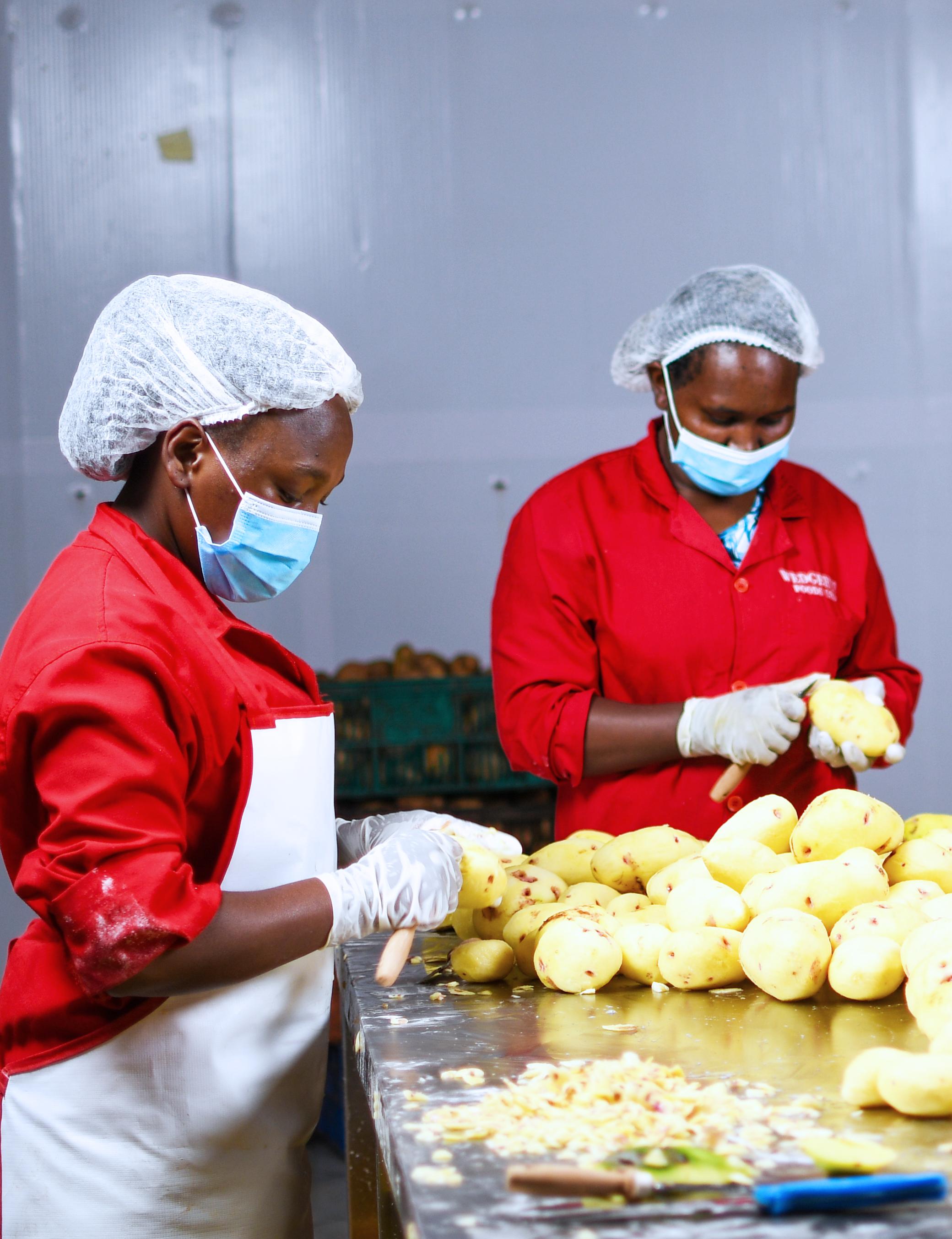


We all love chips! Whether as a once-in-a-while guilty indulgence or a perfect lunch date, these long slices of potato that are lightly fried golden always find a way of gracing our meals. The journey to our plate is, however, a long one and involves some not-so-clean steps that most consumers- and increasingly today, processors- would rather avoid. Nobody wants to go through the tedious and dirty process of peeling potatoes. Even the workers at your favorite food service restaurant don’t, or why else would they have you peeling them if, for whatever reason, you fail to pay your bills?
While most of us see this critical step as an inconvenience, Wanjiru Mambo, the Founder and CEO of Wedgehut Foods saw it

as an opportunity and has today built an entire business that not only generates income for her but is also a source of employment for 30 other staff. “We are in the value addition of potatoes where we get potatoes as they are from the farmer, do the sorting, the cleaning, the peeling and finally packing,” she says. “The end product is fresh, ready-to-cook potato.”
A PANDEMIC BABY
Before the Pandemic, if you asked Wanjiru, a marketing graduate and certified public accountant, whether she would see herself doing what she does today, the most probable answer would have been an emphatic No. But Covid created a “new normal” which completely disrupted life as we knew it. For Wanjiru, Covid meant a complete halt to her previous business venture. “I had a restaurant
in Upper Hill that shut down,” she reveals. The restaurant could no longer operate as the Ministry of Health had given an order for all outlets and eateries to close down in an effort to curb the spread of the pandemic.
The closure left Wanjiru with a huge consignment of potatoes that she and her household could not consume. “I started selling them in the estate where I live and that's the same time people were doing panic buying,” she narrates. No sooner had she started than her stock ended. “I went ahead to get some more from Limuru and sold. But then in the process, I was just thinking, what else can you do with potatoes? So that's where the idea of processing and adding value came about.”
BABY STEPS GIVE WAY TO BIG CLIENTS
Enthused with the new business prospect,
she approached a friend who had experience processing potatoes for some insights. She got more from the conversation than initially planned. “They were willing to allow me to purchase some of the equipment they had and even set up the company at their space.” With manufacturing sorted, the next challenge was to find clients willing to buy her products. “I was lucky to land one a big client in the name of Naivas,” she reveals. Naivas Supermarkets is one of the largest retail chains in East Africa with over 91 stores as of December 2022. Wanjiru however reveals to us that in the industry where she operates, “people just trust you with small quantities,” at first as they gauge your ability to deliver. In the Naivas case, she reveals that only three branches were assigned to her at first. More were added later as the relationship developed, and she was able to demonstrate the ability to deliver on larger orders. A proud Wanjiru notes that the fact that Naivas is still one of her major clients 2 years after she got her first order from the supermarket chain is proof Wedgehut’s ability to consistently meet customer needs.
Today, Naivas is not the only major brand in Wedgehut’s portfolio. The client list has expanded to include other major brands in the food service industry in Kenya. The clients are categorized into retail, restaurant chains, and institutional clients. Joining Naivas in the retail chain is Quickmart, the second largest supermarket in Kenya. Wanjiru explains to us that Wedgehut products don’t end up on the shelves of these supermarkets. Instead, they are delivered directly to the deli section of the supermarket where they are used to make fries and other potato-based ready-to-eat products for the on-the-go consumer.
If you have enjoyed fried chicken at Chicken Inn or Galitos, chances are that the chips that accompanied them were from Wedgehut foods as Simbisa Brands, the restaurant chain’s parent company is one of Wanjiru’s biggest clients. Simbisa together with Java House Africa form part of the notable brands in WedgeHut Food’s restaurant chains category. The institution’s list includes various prestigious schools like Strathmore and Braeside alongside major hotels including Safari Park, Ole Sereni, and Crowne Plaza.
When it comes to dealing with large clients, Wanjiru tells us the only secret is consistency in the quality of delivered products. She confesses that when setting

WE ARE IN THE POTATOE VALUE ADDITION BUSINESS WHERE WE GET POTATOES FROM THE FARMER AND PROCESS. THE END PRODUCT IS A FRESH, READYTO-COOK POTATO.
Wanjiru Mambo, Founder & CEO, Wedgehut FoodsWanjiru Mambo, Founder & CEO Wedgehut Foods Limited
up, there were challenges, particularly with the packaging, but she made sure that her team did not compromise on what was inside the packaging. “We made sure the quality was good,” She says. Having fewer players also played to Wanjiru’s advantage. “We are not so many processors in the industry and that has worked to our advantage thus far.”
SOURCING THE RIGHT POTATO
The search for the right quality of potatoes had Wanjiru scouting Kenya’s country sides where potatoes are known to be available in abundance. In her scouting escapades, she quickly realized that in the abundance of potato supply lay a scarcity in the availability of potato that was of processing quality. Reason for this market anomaly according to Wanjiru was an information gap. ‘Farmers simply don't understand what a potato for processing is and that has been quite a challenge,” she says. What makes a potato to be of processing quality? I ask. “For us, number one is the size, then the variety,” She answers succinctly. Size is important for WedgeHut as potato chips are the most highly sought after by its clients and these need to be “very good and long enough,” Wanjiru explains. When it comes to variety WedgeHut’s order of preference is Shangi, unica, and Markies. “Shangi and Unica, they are very sweet. Most companies or eateries prefer them because of their sweetness.” Though not her number one choice, Wanjiru describes Markies as a potato variety that is of exceptional processing quality. “It doesn't have deep eyes and thus produces minimal waste during processing.”
Most farmers however don’t always get it right during farming so they end with very small-sized potatoes that are of little use to WedgeHut and most processors. The ugly face of this anomaly showed itself when it was revealed to the media that KFC, an American multinational fast food restaurant chain with a sizeable share of the Kenyan fast food market, was importing potatoes while potatoes were rotting away in Kinangop, one of Kenya’s leading potato producing regions.
Wedgehut, although a small player in the potato value chain, is currently doing its best to try and correct the situation. Wanjiru tells us that her company is one of the members of the Mavuno Zaidi program which seeks to improve the quality of potatoes produced at the farm. The program is led by Sygenta East

Africa which educates farmers on the good agricultural practices required to produce processing quality potatoes. Equity Bank, one of the largest financial institutions is also part of the program as a financial partner. “Farmers say the challenge they have when it comes to doing proper farming is money and that is why Equity has come in as the financier,” Wanjiru explains. Other players include Fresh Crop which provides farmers with certified seeds and Yara which supplies fertilizer.
The impact of the program has been phenomenal, both to farmers and processors like Wedge Hut. Wanjiru reveals that the ones who have attended the program now approach farming from an agribusiness point of view. They know the importance of soil testing before farming and the value of crop rotation particularly in maximizing land potential. Access to certified seeds and required fertilizer coupled with financing solutions has also ensured that farmers produce the right quality of potatoes that WedgeHut can use to make its range of products that is not only comprised of potato chips but also Wedges,
CONSISTENT ADHERENCE TO QUALITY AND SAFETY IS WHAT HAS OPENED BUSINESS FOR US BECAUSE WHEN PEOPLE COME TO DO AUDITS WE ALWAYS MEET EXPECTATIONS
Cubes, and peeled whole potatoes. Wanjiru reveals to us that about 265 farmers with a combined hectarage of about 3000 hectares are part of her company’s sourcing program. When it comes to sourcing, location is not of importance. “We work with farmers from across the country,” she says. “It just depends on where we are able to get a perfect potato.”
MAKING FOOD QUALITY AND SAFETY A PRIORITY

Wanjiru’s biggest achievement is ensuring consistent adherence to quality and safety. “It has given us mileage and that's what has opened up business for us because when people come and do the vetting or the audits, we always consistently met expectations,” she says. In areas where improvement has been required, she notes that the company has always been open “to learn and evolve and adopt best processing practices.” To achieve this, Wanjiru, a marketer and certified public accountant by profession, has had a lot of learning to do. “It's been quite a learning experience every day,” she says. “I didn't know food is such a huge thing. How you do your

KEY NUMBERS
10,000
KILOGRAMS OF POTATOES THAT WEDGEHUT CAN PROCESSES IN A DAYprocessing, how you set up is such a big deal!”
She also admits that bringing on board people who have the knowledge on food processing has really helped her get everything right. At Wedgehut, those people include two production managers and one quality assurance officer. She notes that having trained and experienced people in her production and quality department has ensured that each process batch meets the necessary quality and safety specifications. Her team also come in handy particularly in enabling the business to adopt and implement food quality and safety recommendations
given by clients. Wanjiru is also glad to have such an impressive team of food technologists as it relieves her of the responsibility to handle customer complaints while also giving her the reassurance that it will be handled in the most competent way. “I don’t respond directly to customer complaints,” she says. “The person in charge of quality assurance writes back to clients from a quality perspective complete with recommendations.” Clients will always say they are right, but Wanjiru reveals that at times they could be the ones having issues, and with a competent team, Wedghut is always in a position to give recommendations on possible corrective actions to take.

A FOCUS ON CASH CLIENTS
In any business, cash is King. But in the market where Wedgehut operates, the Queen in form of credit runs the streets. Wanjiru reveals that while farmers expect prompt payment for their produce, Wedgehut customers operate in a credit system where payment is made between 30 and 45 days. This greatly creates cashflow issues for the upstart company. A shrewd business lady, Wanjiru is turning her focus to a new category of clients: Cash clients. She explains to us that this category is comprised of smaller restaurants that are coming up, especially in the upmarket which normally take a shorter credit cycle of between 7 and 14 days. She sees a lot of potential in this avenue as most of these businesses are opening up in spaces such as top floors of buildings where space is very limited. “Because of how potatoes are processed, the peeling is a bit hectic and it's a very dirty process,” Wanjiru explains. “So the best thing is to just get ready to cook potatoes” and that’s where Wedgehut comes in.
The company has also opened up a directto-consumer channel that delivers small orders from as low as 3 kilograms per order. These ones pay in cash and are particularly critical in balancing the cash flow. Digital has been the main channel for reaching these clients with the company already having a significant following across its social media channels including Facebook and Instagram. These clients have also turned out to be very valuable when it comes to referrals. “Sometimes a customer samples our product and its works very well for them and they end up recommending you to a hotel or hotel owner. Other times it’s a chef who sampled for his own personal use but
ends up recommending us at their workplace because they liked the product we offered.”
THERE IS MONEY TO BE MADE FROM POTATO
The potato business, despite its various challenges, has proved to be very lucrative for Wanjiru. With the performance so far, She believes that there is more money to be made in from potatoes as demand for chips and other potato products expands. She forecasts that with the current trends, potato is well on its way to overtaking Maize as Kenya’s mostconsumed food product. “Look at our kids,” she poses. “Not so many will go and ask for Ugali in a restaurant, but you find people asking for potatoes.”
Given its potential, Wanjiru would love to see more farmers give potato farming the attention it deserves. Already, a crop is emerging of young, well-educated farmers going back to the rural areas to do potato farming. Given their exposure, Wanjiru notes that this group of farmers is opting to adopt proper farming methods right from the start which has helped improve their revenues. More farmers need to join to ensure that the country has an adequate supply of good-quality potatoes. She notes that if done right,”you can actually make more than just enough to feed your family. You can even make money for school fees and other things.”
HUNT FOR A STRATEGIC PARTNER IS ON

As the market for potatoes continues to rapidly expand, Wanjiru wants her company to continue playing an increasingly important role in the value chain. So far the company has been taking an organic approach when it comes to growth. “We have been upgrading as we go,” she says. “When operating at full capacity, we can do even ten tonnes in a day.” The goal is to however be in the big leagues. She tells us that getting in that arena involves bringing on board technologies like automation for consistency, efficiency, and food safety. “We're looking at also doing the frozen line which is in demand right now,” she reveals. “The government has taxed heavily people who are importing, so if we can do it locally, we are at an advantage.” Wedgehut also has plans to enter into the potato flour business. The flour not only brings in revenue but also “sorts out some of the waste.” Starch, one of her biggest headaches “because its forms a gummy thing that blocks waste stream pipes,” could also be turned into a revenue generating product. Finding a way to process that would actually be of great benefit to her zero-waste strategy. “So that's where we are looking forward to and we hope we can get strategic investors to help us get there.”

TRENDS IN FORMULATING, PROCESSING, PACKAGING & CONSUMPTION OF DAIRY PRODUCTS
How Zaidi uses technology to improve incomes of smallholder dairy farmers in Kenya
 By Paul Ongeto
By Paul Ongeto
Smallholder dairy farmers account for 56% of the 5 billion liters of milk produced in Kenya. Despite heavy investments by milk processors, a significant portion of this milk (over half) is still handled by the informal dairy value chain. Graham Benton, who founded and ran Zaidi Technologies,
believes that for this value chain to thrive despite the onslaught from formal trade, "it must be doing something right. Something that works for everybody in that value chain which the formal market can't or is unwilling to serve.”
What makes the informal sector thrive, according to Benton, is its value proposition for the farmer. Unlike formal
trade where smallholder farmers deliver milk only to be paid in a 30 to 45 days cycle, in the informal trade, payment for milk delivered is prompt, often on a daily or weekly basis. The farmgate price in the informal sector is also often higher (up to half of the final price) when compared to the formal where it can go as low as 25%. Benton says this makes informal trade immensely popular among farmers that if they were asked to choose between a cooperative or a formal business or a guy with a motorcycle, the guy on a motorcycle is preferred almost every time.
A HIGHLY INEFFICIENT SYSTEM
Despite its immense popularity, inefficiencies within the system mean that farmers do not always get a fair value for their milk. To avoid complex maths associated with recording the true quantity of milk each farmer delivers, Benton says that most middlemen often round off the quantities to the nearest liter. The loss in uncaptured quantities (which ends up not being paid) can be as high as 20% per delivery, which is significant given that the average milk delivery per farmer is 4 liters.
keep their records manually on books, and in the event the famous "black book" is unavailable, a piece of paper is used in the hope that information will be transferred to the main records book. Where even a piece of paper is unavailable, farmers have to rely on their middleman's memory which is an even worse method of keeping records. Whenever deliveries are not accurately captured, which is common, disputes always arise and most often end up with the farmers not receiving payment for milk delivered.
ENHANCING FAIRNESS THROUGH TECHNOLOGY
With technology, however, Zaidi helped transform the informal dairy value chain in Kenya to make it more lucrative, inclusive, and fair to farmers and all other players in the sector. The startup developed an app that solved two of the biggest pain points for farmers, accurate measurement and proper record keeping. “If the little digital scale says 2.37 Kgs, then it's 2.37Kgs that will be recorded in the app which then does all the math,” Benton says.

Digitizing the entire milk purchasing process has brought a level of transparency to the value chain that never existed before. Benton notes that with the app, “the farmer knows that they're not just giving milk to this guy who's taking records on the back of a piece of paper,” but rather his milk is going into a system that is doing meticulous calculations and keeping records. Farmer incomes have also improved as the amount previously lost to rounding off is captured fully and paid for.
Even with digitalization, Zaidi does not veer off from the value chain’s main selling point: prompt payment. “We did a seven-day cycle,” Benton reveals, adding that “with some very affordable tricks,” the company could bring the payment cycle down to daily. Like other aspects of the system, payment is digitalized. Farmers receive their payment through the mobile money transfer platform M-Pesa which creates “bankable records" that farmers could use to improve their credit scores. Although weekly is
WITH TECHNOLOGY, ZAIDI HELPED TRANSFORM THE INFORMAL DAIRY VALUE CHAIN IN KENYA INTO MORE LUCRATIVE, INCLUSIVE, AND FAIR TO FARMERS AND ALL OTHER PLAYERS IN THE SECTOR.A guy on a motorcycle is the most preferred milk trader by farmers.
the preferred payment cycle, Benton reveals that with digital, farmers are allowed to choose whichever cycle fits them, be it twice a week or twice a month.

THE ROLE OF MILK ATMS IN INFORMAL TRADE
Milk ATMs played a critical role in realizing Zaidi’s goal to modernize the informal milk value chain in Kenya. According to Benton, ATMs allows companies to sell milk at a much more affordable price. If you go to a supermarket, a 500ml packet of pasteurized milk retails for KES50 while UHT milk sells for KES60 or KES70, depending on location, Benton observes. In comparison, 500 ml of milk from an ATM retails at between KES35 and KES45. Moreover at the ATM, consumers are not restricted to buying milk in particular quantities, they can always buy whichever amount they need from as low as KES10. This makes the milk sold through informal trade channels immensely popular among low-income areas where consumer purchasing power is limited. Benton adds that consumers prefer the taste of ATM milk when compared to packaged milk as it closely resembles the original taste of raw milk.
Before Milk is delivered to the
ATMs, it must, however, pass through a contracted processing facility where it is pasteurized for safety purposes. Benton further assures that tests are conducted on the milk post-processing
to ensure it meets the minimum quality standards. The process of delivery is also optimized to ensure that ATMs only receive the amount of milk that they are likely to sell based on their historic performance. This reduces

KEY NUMBERS
NUMBER OF FARMERS THAT HAVE BEEN IMPACTED BY ZAIDI TECHNOLOGIES
waste which is a key problem in most fresh food value chains in Kenya.
Despite its critical role in the informal milk trade, Benton admits that the current milk ATMs are not optimized for the function of dispensing milk to customers. “Nothing is built for each other,” Benton reckons. He notes that the “containers are not built for the refrigeration unit, which is not built for the dispenser,” and this greatly diminishes the effectiveness of the machine. Another big challenge, according to Benton, is that the machines are very inaccurate which at times leads to them either underdispensing or over-dispensing milk. This he reckons was Zaidi’s biggest obstacle to scaling up its technology despite it having a direct impact on more than 700 farmers in Kenya’s central highlands and having the potential to onboard even more. "What really needs to happen is that somebody needs to come in and develop from the ground up, a fully functional and working milk ATM.”
Today, Benton is continuing his work of improving the dairy value chain and is looking at developing new ways to ensure that quality milk reaches customers at a fair price, while ensuring an equitable value chain for farmers
BeverageTECH
TRENDS IN FORMULATING, PROCESSING, PACKAGING & CONSUMPTION OF BEVERAGE PRODUCTS
Manufacturers strategise to mitigate inflation in Africa's soft drinks market
 By Christopher Day
By Christopher Day
With an average inflation rate of 13.5% for 2022, Sub-Saharan Africa (SSA) has been subject to high levels of inflation, thereby placing pressure on both consumers and manufacturers. SSA consumers have become highly price sensitive and are now either downtrading to more affordable products or reducing their
overall consumption levels.
Most soft drinks have experienced much stronger retailing price increases in 2022, predominantly driven by rising input costs. Manufacturers and retailers have adapted their business models and strategies to mitigate high inflation, while accommodating changing consumer preferences. These include price point management,
extended promotional windows (by staggering individual brand promotional offerings) and the rise of private label participation in certain markets.

PRICE MANAGEMENT STRATEGIES DEPENDENT ON PRICE ELASTICITY
Price point management has emerged as a key mitigation strategy. While manufacturers have the challenge of adjusting their prices to retain profit margins, they must ensure the new product price remains within their targeted band to prevent consumers from downtrading. However, when setting optimal prices for products, these strategies must be viewed in conjunction with varying price elasticities of demand for different products, which measures the sensitivity of price changes to consumer demand for certain soft drinks.
Energy drinks is the most sensitive category to price changes, forcing manufacturers to be cognizant of the trade-off between price increases and foregone sales. Price sensitivity is high among energy drinks brands due to growing demand and wide brand variety. A strong substitution effect between brands is evident, such as due to large price increases, which encourage consumers to shift to more affordable energy drinks, or alternative soft drinks.
Conversely, concentrates is the least sensitive to price increases, as high levels of brand loyalty exist, with affordable pricing compared to other categories. Moreover, there are limited numbers of concentrate brands available,

resulting in relatively subdued competition and allowing for strong price increases without manufacturers running the risk of losing share. As a result, companies are adjusting their prices by considering these elasticities, to maintain stable revenue and profit margins.
CHANGING PROMOTIONAL WINDOWS SHOWS DYNAMIC NATURE OF MANUFACTURERS AND RETAILERS
Another strategy employed by retailers is longer promotional windows. This strategy has been applied across several distribution channels by large players, such as Coca-Cola and Red Bull, including discounting, buy-one-get-one-free deals, and complementary offerings often sold as a mixer with an alcoholic spirit.
Importantly, this strategy is considered essential by manufacturers as it is adopted by most competitors, and they cannot run the risk of losing share through consumer brand shifts.
KEY NUMBERS
13.5%
AVERAGE INFLATION RATE FOR 2022 IN SUBSAHARAN AFRICA

Additionally, it is commonplace for promotional windows to be scattered across several categories, allowing companies to offer promotions on a rotational basis. Thus, the overall promotional window for specific categories has not increased significantly, but the overall company promotional window period has expanded, improving brand presence throughout the year, instead of only during peak demand months. In turn, this allows for greater sales through higher volumes than what would have been sold at non-discounted prices, thereby retaining positive revenue
growth.
PRIVATE LABEL AS AN INFLATION MITIGATOR DEPENDENT ON LOCAL CONTEXT
Private label has a varying degree of popularity across Africa. South Africa is considered the most mature soft drinks market with several dynamic players operating across the country. This high level of competition fosters innovation and as a result, the local industry has a significant private label contribution. Moreover, as private label penetration grows in South Africa, retailers continue to innovate and improve quality year-on-year, with private label quality now comparable with heritage brands.
However, this is not always the case for private label lines. In Kenya for example, private label offerings have not been as successful and do not comprise a significant proportion of the local market. Much of this stems from comparatively low penetration levels of modern retailing, low consumer trust of private label due to
counterfeit products, as well as the associated lower levels of quality derived from limited flavour innovation.
KEY TAKEAWAYS FOR MANUFACTURERS AND RETAILERS
Soft drinks manufacturers and retailers will need to ensure dynamic and varied strategies to manage rising inflation in Africa, which is expected to continue into 2023. Across these strategies, the main driving concern amongst manufacturers is to preserve affordability, while mitigating the higher input costs associated with rising global inflation.

Effective price point management will need to consider the price elasticity of demand for a given category, as this will determine how much of a price increase a retailer or manufacturer can demand. This means categories with low price elasticity, such as concentrates, are expected to see greater price increases compared to energy drinks, which are highly price sensitive due to strong competition. Secondly, brand promotions are more spread apart from one another, thereby increasing the promotional window for soft drinks overall. In turn, brand owners have extended their promotional windows respectively, to retain their consumer brand loyalty through a strong value proposition. Finally, private label as a retailer strategy will become increasingly prevalent in mature soft drinks markets, as is the case in South Africa. This is due to the established nature of private label, which in some cases, now rivals heritage brands in
both quality and value. However, stronger growth of private label is not expected in less developed soft drinks markets, as consumers are still reluctant to move away from heritage brands, until recognition and the quality of private label improves.
Across these strategies, the driving manufacturer concern is to preserve affordability to the consumer, while mitigating the higher input costs associated with rising global inflation
EFFECTIVE PRICE POINT MANAGEMENT WILL NEED TO CONSIDER THE PRICE ELASTICITY FOR A GIVEN CATEGORY AS THIS WILL DETERMINE HOW MUCH OF A PRICE INCREASE A RETAILER OR MANUFACTURER CAN DEMAND.A convoy of Pepsi-trucks during the lauch of ne 600ml ColaPET bottle
UPDATE ON INVESTMENTS OPPORTUNITIES & MARKET TRENDS IN AFRICA'S FOOD & BEVERAGE INDUSTRY
Report ndustry

Homegrown brands rise to challenge multinational’s stake on Tanzania’s soft beverage market
 By Abel Ndeda
By Abel Ndeda
Steadily but sure of achieving growth, Tanzania is becoming one of the most vibrant soft beverage markets in East Africa. The industry is already attracting both local and international companies to join in the quest to quench the thirst of over 63.59 million Tanzanians who yearn for either water, juice,
energy drinks, or soda.
Prospects are good, with the World Bank in its economic review of the East African nation noting that despite rapid population growth, Tanzania has achieved relatively strong economic growth and declining poverty rates. Despite the headwinds of the Covid-19 pandemic and the Russo-
Ukrainian war, Tanzania managed GDP growth of 4.6 percent, marginally higher than 4.3 percent growth in 2021, according to the Bank.
Generally, on-trade volume sales of soft drinks are very limited in Tanzania while the off-trade volume sales of soft drinks continued to see a strong recovery in 2022, with distribution continuing to expand and life returning to relative normality after the pandemic.
According to Fitch Solutions, food and non-alcoholic drinks account for the largest share of household spending in Tanzania at approximately 29.1% in 2023. Over the medium term (2022-2026), the firm forecasts a strong expansion of Tanzania’s soft drinks sector driven by robust demand for carbonated drinks.
Carbonated drinks are widely popular in the country, as it is common to offer such beverages to guests and even customers in shops.
KEY NUMBERS
US$399M
THE
With a projected expansion of disposable incomes, urbanization, and changing consumer preferences
over 2022-2027, Statista forecasts the Tanzanian soft drinks segment to amount to US$399.4m in 2023 with an expected annual growth annually of 5.87%. However, the industry also faces challenges such as high taxes, lack of access to finance, and a lack of infrastructure in rural areas. Even with the challenges, the pace of direct local and foreign investments has risen significantly over the last 15 years, with small and medium players continuing to pop up, with some of them growing into significant players.
RISE OF B-BRANDS
The soft beverage industry in Tanzania is dominated by American beverage companies Coca-Cola and PepsiCo. The country seems to be among the few in Africa where Pepsi has the lead over its rival Coca-Cola.
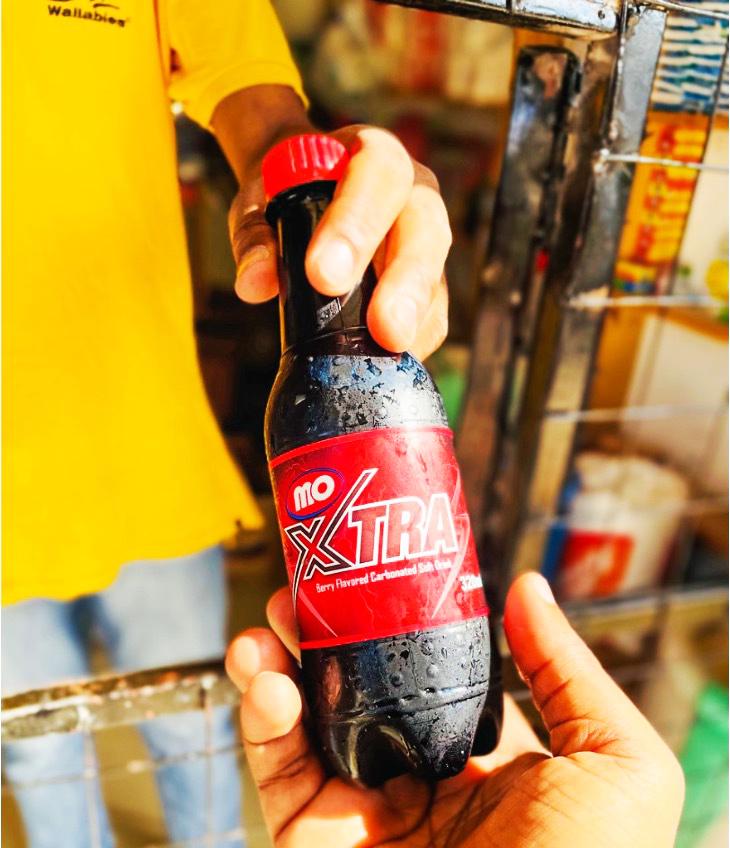
According to a 2020 Sagaci research, 53% of Tanzanian consumers preferred taking Pepsi while just 40% had a liking for Coca-Cola products. The remaining 7% could be the ones lured by a rise of homegrown brands such as Azam and Mo Cola. These brands backed by their deep-pocked parent companies Bakhresa Group and Mohamed Enterprises Tanzania Group respectively have spiced up competition in the sector.
Azam Cola, the first foray into the carbonated drinks market by Tanzanian family-owned company Bakhresa, has inspired many local brands to rise in the competitive soft beverage market that has been majorly flooded by foreign brands. A year and a half after hitting the market quietly, Azam Cola won 30 percent market share bringing in approximately US$90m in sales, said Daniel Hill, Bakhresa’s group sales and marketing manager. Mohamed Enterprises Tanzania Limited (MeTL) flagship brand Mo Cola, named after Mohammed Dewji, Chief Executive of MeTL, is also reported to have taken 3.5% of the market in Tanzania two years later from launching in 2014.
MeTL plans to further shake up the industry. In June 2022, the company
VALUE OF TANZANIA'S SOFT DRINKS BEVERAGE MARKET IN 2023.B-brands such as Mo Xtra are increasingly becoming visible in the Tanzanian market.
announced plans to invest US$1 billion to expand his business and take on the rivals in the country. Group CEO Dewji said that the investment will be made over three to five years, about 15% of which will be deployed to fund operations in neighboring countries such as Rwanda and Uganda. “We are investing heavily into the carbonated soft drink business, where we really want to take on Coke and Pepsi with homegrown brands,” Dewji said. “We are already dominant in some of the brands, but now we are setting up shop everywhere around the country, wherever Coke is present. Speaking in an interview with CNN’s Connecting Africa, Mr. Dewji shed more light on the company’s brands by revealing that MeTL was planning to raise production to 3 to 4 billion bottles in the next 3 years from 1 billion in 2022.
Bharat Thakrar, former Chief Executive of Kenya-based advertising and marketing firm WPP-Scangroup, calls these local companies ‘B-brands’ because they tend to represent a lower tier of competition. Historically, he averred that B-brand products have been underpriced, with firms investing little in marketing. “They’re creating that brand love and brand equity. They’re local, they’re low priced, [and] in terms of quality they’re as good as the top brands,” said Thakrar.
ENERGY AND MALT DRINKS TAKE A CENTRAL PLACE
Energy drinks are also immensely popular in Tanzania. As early as 4 a.m. in Tanzanian bus terminuses, many bus drivers and their assistants are seen with an energy
drink in their hands just to tune up their brains and keep them sharper for the day’s activities. Most of the drinks are brands that have sprouted recently and are fairly priced like Azam, Vimto, and Tzinga. According to a study by the Tanzania Food and Drugs Authority (TFDA), energy drink
consumption in the country has increased by over 50% in the past decade. The TFDA study found that the majority of energy drink consumers in Tanzania are young men between the ages of 18 and 35. The study also found that energy drink consumption is more common among urban residents than rural residents. Packaged mostly in PET bottles and costing less than a quarter of the cost of their bigger rivals, these entrant brands have been readily

ACCORDING TO A 2020 SAGACI RESEARCH, 53% OF TANZANIAN CONSUMERS PREFERRED TAKING PEPSI WHILE JUST 40% HAD A LIKING FOR COCA-COLA.
accepted by consumers in demand for an energy boost but lacked enough money for the pricier drinks.

In the premium segment, Red Bull is still the most popular energy drink in Tanzania, with a wide distribution network and strong brand recognition. Monster Energy is a close second to Red Bull in terms of popularity in Tanzania. It is known for its high caffeine content and is popular among young men looking for a boost of energy. Rockstar is another popular energy drink in Tanzania. It is available
consumer demand for non-alcoholic options. These drinks are made from malted barley, water, and sugar, and are often flavored with fruit or other natural ingredients. Almost all major home grown beverage companies have a malt drink in their portfolio. Bakhresa has Malti while MeTL has Mo Malt which is available in two variants. One popular malt drink brand in Tanzania is Chibuku, produced by Tanzania Breweries Limited (TBL). Chibuku is a traditional African malt drink that is enjoyed by people of all ages. It is available in a variety of flavors, including banana, pineapple, and vanilla. Other popular brands of malt drinks in Tanzania include Castle Lite, which is produced by SABMiller, and Ndovu, which is produced by Serengeti Breweries Limited which is part of East African Breweries Limited. Efforts of companies like TBL to expand their distribution networks and reach more consumers, especially in these areas are really paying off.
WATER BUSINESS GATHERS MOMENTUM
In recent years, bottled drinking water has emerged as an easy way through which potable water is supplied to consumers, especially in cities and urban areas. According to a report by Research and Markets, the market for bottled water in Tanzania is projected to reach US$205 million by 2025, growing at a CAGR of 7.8% during the forecast period from 2020 to 2025. The dramatic rise in the consumption of

in a variety of flavors and is often marketed as a party drink. Power Horse which is produced by the Tanzania Distilleries Limited (TDL) and B-Energy are local energy drink brands that are becoming increasingly popular in Tanzania. The latter is known for its fruity flavors and is often consumed by women and children while the first is known for its affordable price point than many of the international brands and is often consumed by low-income consumers and manual workers.
The energy drinks market in Tanzania is projected to grow at a compound annual growth rate (CAGR) of 9.1% over the analysis period of 2021 to 2027, according to data and analytics company StrategyHelix. The increasing popularity of various product offerings, growing consumer inclination toward reduced sugar & sugar-free beverages and increased promotional and advertisement strategies by the manufacturers are expected to boost the market growth in the coming years.
Malt drinks are, on the other hand, trying to catch up to the more established drinks. Their popularity is driven by


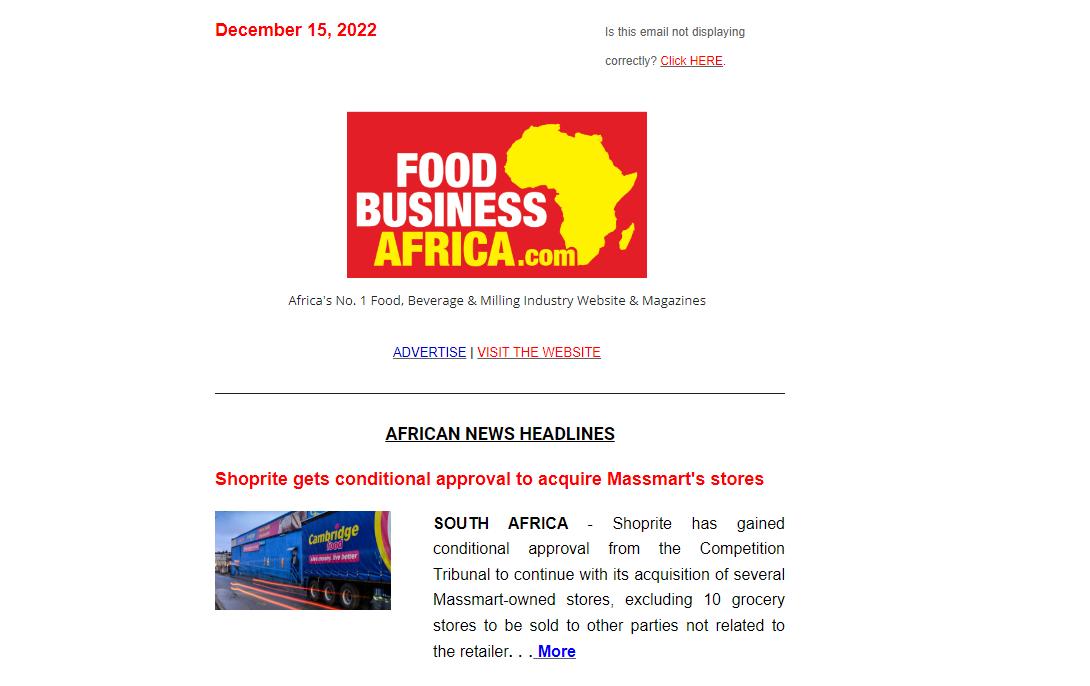


bottled water is attributed to its affordability, convenience, consumer connotations of higher social status, and the prevalent conception that it contains fewer contaminants. Bottled drinking water is also perceived to taste better compared to tap water and is served at many organized gatherings, such as meetings, parties, workshops, and conferences.
The market is dominated by large players including Bhakresa (Uhai Drinking Water), MeTL group (Masafi mineral water) and IPP group (Kilimanjaro Drinking Water). Given its low barriers to entry, the market is however saturated with other medium and small scale brands. Asoko insights in its 2019 research documented a total of 25 drinking water companies of varying sizes. Combined, these businesses compete for water market that is forecast to reach 198.23 million, according to Market Research. Growth is also robust with average consumption per capita reporting a CAGR of 7.51% per annum in the medium term (2025).
JUICE CATEGORY IN NASCENT STAGES
Unlike CSDs, the Juice market in Tanzania is still in its nascent stages of growth. According to Market research, the juice market in Tanzania is forecast to increase at a CAGR of 11.66% per annum for the period 2020-2025 to
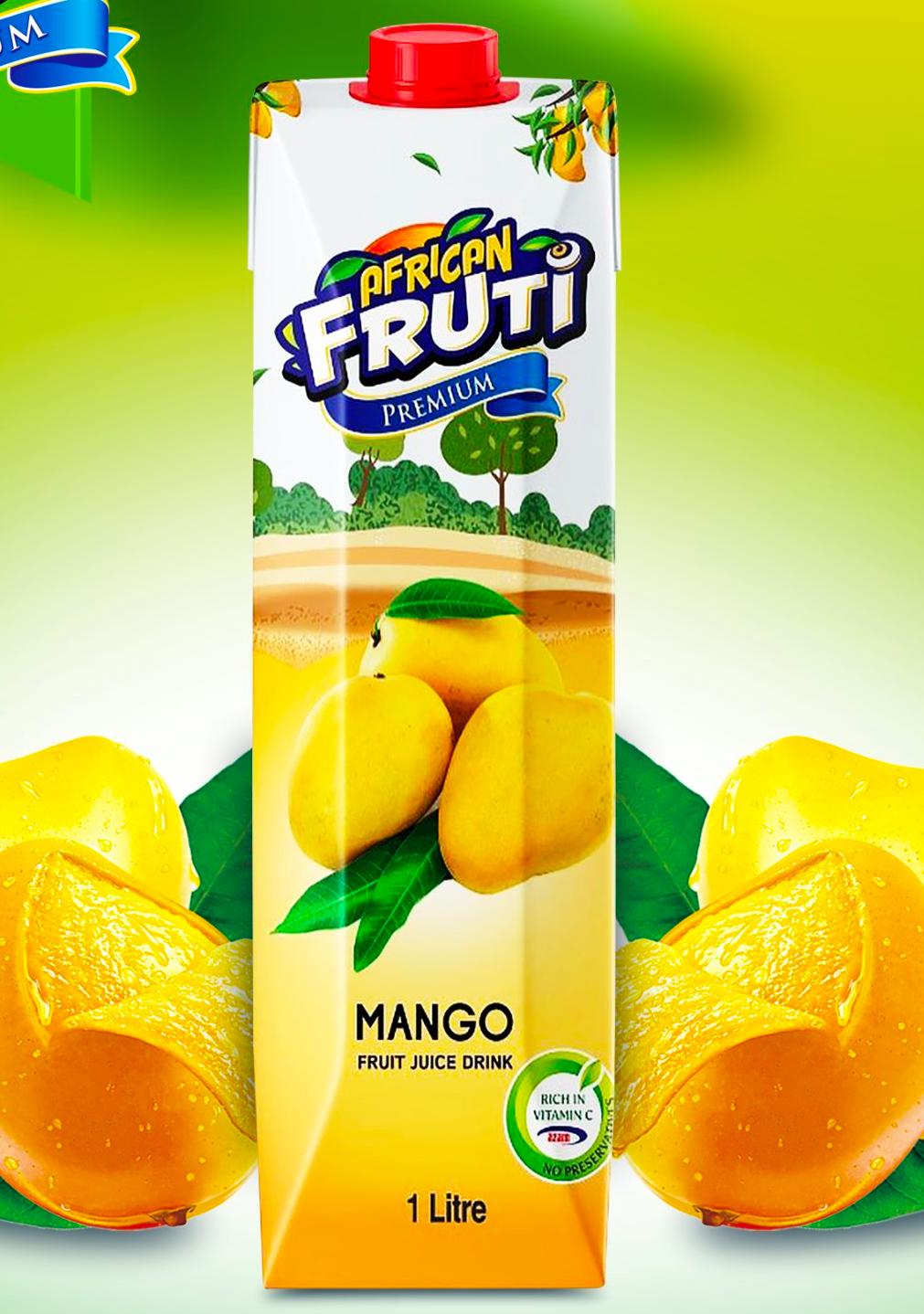
reach US$33.50 million (in retail prices). Leading brands include Azam Juice by Bahkresa Group, and Minute Maid by Coca-Cola. Although demand is relatively low compared to other soft beverages, the sector is still competitive with upcoming players like Sayona Drinks and RimJim beverages disrupting the market with their own brands Frutty’s and RimJim respectively.
As the industry is still small, substandard products are quite common in the market. Tanzania Bureau of Standards (TBS), in 2021, was forced to destroy about 1,300 cartons of substandard juice in the Morogoro Region. The action by the country’s quality watchdog followed a crossexamination of the juice marketed as ‘’Into Orange’’ that revealed high levels of contamination resulting from the company operating in an unhygienic environment. The new findings by TBS was just the tip of the iceberg. “During our study, we found that most of the fresh juice sold on the streets contained the Escherichia Coli bacteria that can cause a wide range of diarrheal diseases to consumers,’’ said Ms. Edeltruds Simforian who is an environmental health scientist from Dar es Salaam.
ADDING SUSTAINABILITY IN PRODUCTION
Whereas soft drink producers are responsible for a huge proportion of Tanzania’s plastic waste problem, the country’s circular economy is not as developed yet. The recycling quota for plastic waste in Tanzania totals just 5 percent of all produced products. No deposit system is yet in place, but many collection points for used PET bottles pay collectors by weight. The raw commodity is then sent for reuse to local recycling companies.
To improve recycling rates, leading beverage companies - One Products & Bottles (MeTL Group), Coca-Cola Kwanza Ltd, SBC Tanzania Ltd. (Pepsi), Nyanza Bottling, Bonite Bottlers, Sayona Drink, Cool Blue Tanzania Pure Drinking Water and Silafrica came together to launch the Polyethylene Terephthalate Recycle Company (PETCO). By coming together the companies aim to collect and recycle 12.5 million tons of plastic waste, setting a course to conserve the environment and boost the economy
THE JUICE MARKET IS FORECAST TO RECORD A CAGR OF 11.66% PER ANNUM TO REACH US$33.50M IN RETAIL PRICES IN 2025.
How the food industry is innovating to create foods that help consumers sleep better
By Queen MwasereAmajority of the global population is reportedly not sleeping well. A recent study carried out in the UK found that 68% of adults are not getting the recommended 7 hours of sleep. Another survey carried out by the British Nutrition Foundation recorded that 43% of adults do not sleep for the appropriate amount of time, with children also following suit on a more concerning level. From the survey, 32% of primary school-aged children
and 70% of secondary school pupils also reported that they were not getting the recommended nine hours of sleep a night. In the US, 35.2% of adults report sleeping on average for less than seven hours a night on a regular basis. Most Americans attribute this to stress from the impacts of the recent COVID-19 pandemic, the struggling economy, and concerns about work, school, and health.
The lack of sleep is turning out to be a multi-million-dollar opportunity for the food industry. According to SPINS data,


sales of sleep supplements market totaled $606,018,667 at the very start of 2021 and had grown a further 21.6% to hit $737,092,129 by the very start of 2022. And the growth is not in supplements alone, the trend is quickly picking up pace in the drinks, gummies, and snacks category. “The increasingly hectic pace of modern life is creating a market for food and drink that helps people of all ages calm down before bedtime, sleep better, and restore the body while they rest,” says Mintel analyst Jenny Zegler.
Just to be clear, regardless of age, consumers regularly enjoy snacking at night. In the US alone, over 85% of American adults snack between dinner and bed and are estimated to consume over US$50 billion annually in nighttime snacks, according to financial news media. Unfortunately, the most popular nighttime snacks are all loaded with excess calories from fat or sugar (or both) which mostly end up hampering sleep. But as more people start prioritizing better sleep, the food industry is responding with products with specific active ingredients that induce or improve one’s sleeping
experience. From supplements to beverages, gummies, and snacks, the list of products with better sleep claim is growing by the day.
PEPSICO LEADS THE PACK WITH DRIFTWELL DRINK

Leading the pack in the race to offer consumers better sleep snacks in PepsiCo. The company which already owns household nighttime snacks launched Driftwell, a new beforebed beverage touted to help with relaxation and sleep. The calorieand sugar-free noncarbonated water, flavored with a hint of blackberry and lavender, contains 200 milligrams of L-theanine and 10% of the daily value of magnesium.
L-theanine is a naturally occurring non-protein amino acid found in tea that promotes relaxation by reducing stress and anxiety levels and therefore improves the quality of sleep by promoting a more relaxed state. Magnesium on the other hand, when taken in various forms, aids the process of falling and staying asleep as it is responsible for activating the parasympathetic nervous system.

Taking cue from PepsiCo, Stuart and his cofounders Georgina and Craig launched a brand known as OHMG magnesium water, which claims to be the world’s first drink that contains three types of magnesium. This beverage is linked with various health benefits that include improved sleep.
ROMR, a wellness organization has also partnered with leading nutritionists and formulators also recently launched their wellness line which includes ROMR Sleep, a fruit beverage that has been enriched with L-theanine, 5-HTP, melatonin and valerian root.
ICE-CREAM AND CHOCOLATES FOR BED
Nightfood, an early-stage company chose the ice-cream category for its snooze snack. The award-winning ice cream is formulated for relaxation and better sleep. It not only contains less sugar, fat, and calories but is buffed up with protein and fibre along with added calcium, magnesium, zinc, and glycine to make you sleep better. A

seal of approval for the product was its recent endorsement as the preferred ice cream for pregnancy cravings by the American Pregnancy Association due to its healthier nutritional profile.
Meanwhile, Colorado-based Good Day Chocolate went for chocolate as its medium of sleep delivery. The company has formulated its range of chocolate supplements with valerian root and L-theanine “to improve and deepen sleep quality.” Valerian, one of the active ingredient in the supplements, is an Asian herb known to reduce the amount of time taken to fall asleep and improves sleep quality.
Horlick, the popular GSK brand took a more traditional approach to tap into the sleep aid market by releasing a new line of Blend shakes. These shakes have been fortified with vitamins B12, B6 and C as well as chamomile and valerian. Vitamin B6, also known as pyridoxine, helps produce serotonin, a chemical that acts as a hormone and plays a key role in facilitating how long and well a person will sleep. The vitamin is also involved in the biosynthesis of melatonin. A lack of vitamin B6 has been linked to symptoms of insomnia and depression according to a column shared by The Sleep Doctor.
CEREALS GET ENRICHED FOR BETTER SLEEP
Cereals are mostly known for breakfast but Post Consumer Goods, a key player in the snacks industry, is revolutionizing the industry with its recently launched cereal brand with sleep enhancing claims. According to Post, Sweet Dreams is enriched with a nighttime herbal blend and zinc folic acid
and vitamin B, all minerals that support the production of melatonin.

Melatonin is a hormone that works with the body’s circadian rhythms to help prepare for sleep by sending signals to the body when it is time to rest, helping one relax, diminishing levels of other hormones that stimulate alertness, and lowering body temperature and blood pressure.
light weight flexible pouch for plant-based milk developed in collaboration

Explaining the need for a new cereal, Logan Sohn, Post’s Senior Brand Manager said: "More than ever, consumers are looking to embrace acts of self-care, particularly as it relates to bedtime routines and we believe a relaxing bedtime routine is key to a good night's sleep."
Post’s Sweet Dreams is not the only cereal in this category. World’s largest food and beverage company Nestle also has a line which consists of infant cereals dubbed goodnight, formulated to help infants fall asleep faster. These cereals are enriched with B vitamins, Vitamin C and E as well as folic acid. Further, Foundry Foods, an innovation incubator backed by Nestlé USA, launched Goodnight, a cluster of snacks formulated with magnesium L-theanine and casein protein to help consumers sleep better. Doug Munk, Nestlé USA’s director of new business explains that the shift to this category is informed by an actual market need. “We all have sleep issues, and we wanted to create a natural product that could really help assist in people’s sleep,” Munk said.

SUPPLEMENTS STILL REIGN SUPREME
Formulation of foods to optimize sleep is relatively a new trend compared to supplements. Sleep supplements however gained popularity during the pandemic as consumers sought natural dietary options that would help manage stress. Data collected by SPINS showed that the supplement category grew by 28.6% from 2019 to 2020.
Today, as more people become concerned about sleep, supplements tailored for a deep snooze continue trending higher. According to data from SPIN, sales in the sleep
IN THE US, OVER 85% OF ADULTS SNACK BETWEEN DINNER AND BED AND ARE ESTIMATED TO CONSUME OVER US$50 BILLION ANNUALLY IN NIGHTIME SNACKS.
supplements market amounted to US$606 million at the very start of 2021 and further grew by 21.6% to US$737 million by the start of 2022.
This category is dominated by melatonin which made up about 91.5% of all sleep supplement sales. US is the biggest market driver for this supplement with 27.4% of adults in the country reportedly using melatonin on a daily basis, according to a survey conducted by the sleep foundation.
Another supplement is ashwagandha, an evergreen shrub best known for its anti-anxiety and stress-relieving effects. The efficacy of the herb to promote healthy sleep is supported by published clinical data. Its popularity is quickly gaining momentum across geographies with Kerry Nutrition Insights listing it as one of the top trending ingredients in foods and beverages in 2023. Recently released forecast from UK-based Exactitude Consultancy support Kerry’s forecast indicating that the global ashwagandha extracts market share will grow at more than 36.8% CAGR to reach above US$3.2 billion by 2028 from a little above US$128 million in 2019.
Some of the latest innovations in the supplements space include Sirio Pharma Twinkle Twinkle Gummy for sleep. The gummies are sugar and gluten-free, from non-GMO sources, and combine a blend of melatonin, passion flower, tea theanine and

lemon balm for that optimum sleep. “The gummy supplements market continues to grow extremely quickly, and we are constantly innovating for our customers to stay ahead of trends,” Sara Lesina, Sirio Europe’s general manager said. Another supplement is
KEY NUMBERS
US$606M
THE SLEEP SUPPLIMENT MARKET SIZE IN 2021.
Goodrays high strength CBD oil drops for Sleep. According to Goodrays, the supplements are made with coconut oil and a soothing peppermint flavour and are “designed to help you relax your body and unwind your mind in preparation for drifting into deep and uninterrupted sleep.”
TECH ACCELERATES ACCESS TO NEW PRODUCTS
As foods with sleep claims start to become popular, IFF and Salus Optima have developed a new technology to help brand owners in the personal nutrition space bring their products within customer reach. According to IFF, the new technology accessible via mobile phones and wearables
will help consumers understand their unique metabolic response to food, supplements, activity, and sleep.“IFF’s partnership with Salus Optima will enable our customers to empower consumers to make sustainable lifestyle choices to achieve their personal health and wellness goals with the blend of a physical product and a digital platform,” said Sébastien Guery, vice president, IFF Health.
A MARKET RIPE FOR MASSIVE INVESTMENT
With many people struggling to get enough sleep, nutrition is emerging as the go-to solution for those craving for a deep uninterrupted slumber. Sleep supplements were previously the only available solutions in the market but more brands are starting to formulate new snacks and drinks that aim to take a share of the highly lucrative nighttime snack segment.
As more consumers increasingly seek out snacks fortified with healthful ingredients (protein, fibre, vitamin C, probiotics), these snacks are certainly expected to grow in popularity. In February this year, Bakery&Snacks reported on the emergence of the Bioactivist consumer, a growing cohort of highly motivated, health-conscious consumers who prioritise nutrition as a proactive health measure. This is the kind of consumer that is seeking healthy snack alternatives to what they were accustomed and is increasingly considered unhealthy. Kate Kehoe, a marketing executive at FMCG Gurus, notes that this trend highlights the opportunity for brands that haven’t joined the bandwagon yet to specifically tailor products to meet this need. Worry about the market shouldn’t be really there as consumers are already accustomed to eating at night and would be more open to idea if they know that your product is packed with beneficial nutrients that will help them achieve the deep and uninterrupted sleep that they have been craving for a while now
GROW YOUR BUSINESS FASTER, MORE SUSTAINABLY

WHY ADVERTISE IN FOOD BUSINESS AFRICA MAGAZINE



• Reach the food, beverage and milling industry in sub-Saharan Africa (East, West, South and Central Africa) and beyond using one publication and website

• Use the first magazine of its kind in the region available in a digital format, providing our advertisers with a worldwide audience
• Advertizing with us opens the door to key decision makers in the food industry


• Gain access to the best read and visited food industry website in sub-Saharan Africa. AVAILABLE IN



ADM invests in new US$30 facility in Spain to meet growing demand for probiotics

SPAIN – Chicago headquartered, ADM, has opened a new production facility in Valencia, Spain to help meet rising global demand for probiotics, postbiotics and other products that support health and well-being in humans, animal, and pets.
The production site represents an investment north of $30m and a more than five-fold increase in ADM’s production capacity, increasing it to 50 metric tons annually.
The first facililty, globally, to produce both probiotics and postbiotics, at the same site, it will allow the US company to supply growing markets for probiotics and postbiotics in the US, AsiaPacific, and Europe.

ADM said the capacity expansion enabled by this build will help it realize its ambition to increase health and wellness revenue from over $500m in 2022 to $2bn within 10 years.
Tate & Lyle PLC rebrands business to become purpose-led and growth-focused
The new facility is located close to ADM’s R&D center in the University of Valencia Scientific Park, where its scientists undertake activity including next-generation genome sequencing and early-stage testing of new bacterial strains.
UK – Tate & Lyle PLC, a Britishmultinational supplier of food and beverage ingredients, has unveiled its new brand intended to help it become a purpose-led, growth-focused specialty food and beverage solutions business.
The rebrand includes a new logo, typography, new imagery as well as a new narrative and tone of voice. At the heart of the brand is the company’s new narrative–Science\ Solutions \ Society, the promise Tate & Lyle makes to its customers, and how it will deliver its purpose.
Nick Hampton, Chief Executive, Tate & Lyle, explained that the company’s commitment to ‘Science, Solutions, Society’ was born out of a deep understanding of its purpose ‘Transforming Lives through the Science of Food’.
Helen Bass, Global Head of Marketing & Insights, Tate & Lyle, said: “This rebrand is not just a new logo or colors, it is a beacon of change for our organization, creating a distinctive new brand, one powerful narrative, that stands out and brings it to life for ourselves and our customers.”
“As the design work was evolving,
we discovered very early on the incredible power of having an ‘and’ – an ampersand – in our name. It is not just distinctive but communicates that Tate & Lyle can, and does, bring more.”
According to Helen, the rebrand shows a continuous curiosity and restlessness to solve challenges, go the extra mile and exceed its own and others’ expectations in the broader world. Therefore the ‘power of and’ became a key part of the design, she noted.

THE REBRAND INCLUDES NEW LOGO, TYPOGRAPHY, NEW IMAGERY, AS WELL AS A NEW NARRATIVE AND TONE OF VOICE.
Ingredients specialist Loryma launches wheat-based binder to optimize meat processing
mainly of wheat starch and wheat protein minimise weight loss due to excellent freeze-thaw stability.
This, according to the company, makes Lory Bind a high-performance alternative to soy-based binding systems.
Norbert Klein, Head of R&D at Loryma, comments: “Wheat is at least as suitable as soy in this context due to its functional properties. It’s also easily available thanks to our European farming areas and, despite a general increase in costs in the recent months, it’s still cost-efficient.”
components are sensory-neutral, so they don’t affect the typical meat flavor.
GERMANY – Ingredients specialist
Loryma has developed halal-certified, wheat-based binding ingredients which give sliced and minced meat rotisserie skewers “the desired cut strength and stability.”

The special binders consisting
Lory Bind derives its properties from the unique composition of wheat. According to Loryma, the wheat starch gives the binders a high water-binding capacity, and the wheat protein – also known as gluten – optimises and stabilises the texture.
“Lory Bind is added during the production process in the usual way,” Loryma said adding that the binding
Döhler taps DKSH to distribute its texturant solutions in Swizerland and Austria
SWITZERLAND – DKSH Performance
Materials and Döhler’s texturants business unit have entered into a distribution and marketing collaboration to provide logistics of pectins, fruit fibers, and fruit powders for the food industry in Switzerland and Austria.
DKSH is one of the leading specialty chemicals and food ingredients distributors and a global provider of Market Expansion Services for business partners in specialty chemicals, food and beverage ingredients, pharmaceutical ingredients, and personal care ingredients.

Döhler will leverage the
collaboration with DKSH to market and expand its texturants segment in Switzerland and Austria.
Dohler customers will also have access DSKH’s technical expertise via its Food & Beverage Ingredients team in Zurich.
“The cooperation with DKSH Switzerland enables our customers to have quick access and service support in the field of texturants,” Dohler said in a statement.
“In this way, they benefit from natural and innovative products as well as DKSH’s combined expertise and experience in the broad range of applications.”
WHEAT IS AT LEAST AS SUITABLE AS SOY IN THIS CONTEXT DUE TO ITS FUNCTIONAL PROPERTIES.
Nobert Klein, Head of R7D at Loryma
Palsgaard pumps US$19.2m in expanding Dutch specialty ingredient facility
polyricinoleate (PGPR), a co-emulsifier primarily used in chocolate production to control flow, reduce viscosity, and optimize molding and enrobing.
It also reduces fat content in margarine spreads and is a highly effective, plant-based color-dispersing aid that replaces petrol-based waxes in plastics.
The expansion, scheduled for completion in 2024, is being undertaken at the Zierikzee plant, which also makes specialty ingredients for margarine and bakery.
essential element of our strategy at a time when demand is growing by 10% a year.”
“Additionally, it will give us a lot more storage capacity, which will help protect our customers against any future supply chain disruptions.”
NETHERLANDS – Palsgaard, a food industry specialist in the manufacture of emulsifiers, stabilizers, and other specialized ingredients, has broken ground on the US$19.2 million (€18 million) expansion project at its specialist factory in the Netherlands.

The expansion is expected to double the company’s global capacity to produce polyglycerol
Palsgaard is moving to try to meet the growing demand for the PGPR ingredients that are projected to have an increased market value to US$2.8 billion in 2033 from US$1.7 billion in 2023, growing at a CAGR of 5.6%.
Kim Bøjstrup, Palsgaard CCO said: “This expansion will boost our PGPR capacity–almost doubling it to 11,500 metric tons annually–so it’s an
Kerry forges new partnerships with Azelis, Caldic to bolster distribution in Europe
EUROPE – Kerry, a food technology and ingredients company headquartered in Ireland, has announced new partnerships with distributors, Azelis and Caldic, to strengthen its distribution network across Europe.
Azelis is a leading distributor of speciality raw materials across EMEA, Asia Pacific, and the Americas while Caldic is an international distributor and manufacturer of food ingredients.
The appointment of these two globally-recognized companies is intended to bring Kerry’s industryleading products and technologies into the hands of more customers in Europe.
The products involved in this partnership will not include Kerry Dairy Ireland, condensed smoke, food service products, retail butchery in
UK and Ireland, pharma products and supplements.
Caldic will support Kerry’s distribution network in South Europe, the United Kingdom, Ireland, the Nordics and Benelux.
Azelis, will on the other hand, be responsible for distribution in Germany, Austria, Switzerland and Eastern Europe, within the food, beverage and meat sectors.
According to Thomas Hahlin Ahlinder, Kerry Europe CEO, the partnerships are an important step for Kerry’s Europe business and will help improve the delivery of its core technologies in the region.

THE EXPANSION IS EXPECTED TO DOUBLE THE COMPANY'S GLOBAL CAPACITY TO PRODUCE POLYGLYCEROL POLYRICINOLEATE, A CORE EMULSIFIER USED IN CHOCOLATE.
Alland & Robert unveils acacia gumbased ingredient to replace gelatin and pectins
FRANCE – Alland & Robert has launched its new tailored ingredient using acacia gum that seeks to help food manufacturers, and in particular manufacturers of confectionery, gummies, and other marshmallows, be able to tap into the ever-growing veganism trend.

According to Alland & Robert, Syndeo Gelling’s composition is based on 100% plant-based hydrocolloids and gum acacia, whose combined properties provide a compromise between gelatin and pectin.
This means that while gelatin provides high elasticity and reduced stickiness, pectin helps achieve firmer, stickier textures with little or even no elasticity. Syndeo Gelling offers low hardness and higher elasticity than pectin, without creating any stickiness.
Azelis adds smoke ingredients to its portfolio with Smoky Light acquisition
One major challenge faced by the manufacturers is that many of those products call for gelatin as an ingredient, are usually made from animal-derived collagen.
Dr. Isabelle Jaouen, R&D director at Alland & Robert explained that since Syndeo Gelling is of plant origin, it improves the image of confectionery and has a lower environmental footprint than products of animal origin.

NETHERLANDS – Food ingredient solutions supplier Azelis has acquired Smoky Light, an established smoke ingredients distributor in the Benelux region market.
Smoky Light B. V (Smoky Light) offers smoke, grill, browning agents and cooking flavours and additives for the food and nutrition industry, from its own formulation laboratory in the Netherlands.
It was first established in 1995 and is currently managed by Ahrend Buckers who will continue to lead the business and support the transition into Azelis, as per the terms of the deal.
This acquisition is intended to strengthen Azelis’ presence in the Benelux region market as well as expand its footprint in the smoke ingredient market in Europe, the Middle East and Africa.
The product portfolio of Smoky Lights strategically complements Azelis’ lateral value chain for the food and nutrition market and the merger will help also expand its expertise and product offering to its customers.
This transaction will not only contribute to Azelis’ range of aroma
formulations, but also build on to their growth strategy. It is also intended to strengthen Azelis’ relationship with its long-established partners.
“Joining Azelis will support our further growth in the Benelux in the short term,” said Ahrend Buckers. “In the long run, we are looking forward to entering a wider smoke ingredients industry which is now possible for us thanks to Azelis’ strong infrastructure in that market.”
THE ACQUISITION IS INTENDED TO STRENGTHEN AZELIS PRESENCE IN THE BENELUX REGION AS WELL AS EXPAND ITS FOOTPRINT IN THE SMOKE INGREDIENT MARKET IN EUROPE
Palsgaard offers two stabilizer blends to beat egg costs in mayonnaise manufacturing
DENMARK - Palsgaard, the world’s full-service emulsifier and stabilizer company, has offered mayonnaise and dressing manufacturers a solution to achieve egg yolk reduction and create egg-free recipes that meet the mouthfeel and viscosity their customer’s demand–yet with greater control over raw material costs.

Using carefully combined stabilizer blends with emulsifying effects, Palsgaard said the manufacturers can freely determine the nature and content of their products, creating both egg-free and egg-reduced recipes with sensory and rheological properties similar to traditional mayonnaises and dressings.
MARKET EXPANSION
Chr. Hansen operationalizes South Africa office to enhance service delivery to customers
SOUTH AFRICA – Natural ingredient solutions supplier for the food industry Chr. Hansen has fully operationalized its South African office in an effort to enhance service delivery to its customers in sub-Saharan Africa.

The office located in Southdowns Office Park, Gauteng, was officially opened in July 2022 with a commitment to contribute towards the growth of the leading global bioscience company across Southern Africa.
With operations now fully up and running, Chr. Hansen plans to leverage its capabilities to serve customers in South Africa, Zimbabwe, Zambia Malawi, Namibia, Madagascar, Mauritius, Botswana, Mozambique, Congo and Angola.
“With customer-proximity and customer-centricity as key motivators, the opening of the office in South Africa will enable us to commercialise and bring concepts to our customers faster,” says Jenny Lombard, General Manager of Chr. Hansen South Africa.
RESEARCH & DEVELOPMENT
A key factor to consider is the mayonnaise’s desired fat content, the company underscored. Using a stabilizer blend suitable for a particular level of fat allows product developers to begin by creating an egg-free version of an existing recipe with similar viscosity and mouthfeel, and later decide how much egg yolk is appropriate to add and declare on the label.
The company guarantees the manufacturers two emulsifiers and stabilizer blends, Palsgaard 5423 and Palsgaard 5426, which can be used in egg yolk-free (vegetable) and egg yolk-reduced mayonnaises.
To realize this goal, Chr. Hansen South Africa has exclusive access to a dairy application centre that is fully equipped, small-scale, fresh fermented dairy plant in Cape Town.
The application center was opened in March 2019 as a joint venture between Chr. Hansen and AECI Food & Beverage to provide better technical support to customers in Africa.
Bio Cannat breaks ground on Morocco’s first legal cannabis lab
MOROCCO – North Africa’s first legal cannabis lab is being constructed in Morocco by Bio Cannat, the first Moroccan cooperative authorized to market and export cannabis and its products for industrial and medical use.
In a statement, the cooperative stressed that it had obtained authorization as part of the ten permits delivered by the National Agency for Activities Related to Cannabis (ANRAC) in October 2022.ANRAC is an agency that was created to oversee the newly established legal
cannabis industry.
The lab, which is now being built in the Chefchaouen region, is considered the first unit in the country and will spearhead development of cannabis for use in many industries, including food, industrial, medical, and paramedical sectors.
“There will be agricultural experiments with some of the farmers in the Chefchaouen region, who are involved in agricultural co-operatives to provide the raw material after providing the seeds intended for this purpose,” the communique added.
Keep up to date with the food, beverage & milling industry in Africa Subscription form





Please complete the following details
Telephone: Website:
Email:
What best describes your main business activity (e.g. dairy, banking, consultant, packaging supplier, NGO)
What best describes your job:
Chairman, CEO, Director General Management
Sales/Marketing
QA/R&D
Others (specify)
NOTE: An invoice will be generated once we receive this form
Would you like us to have a feature on your company? Yes
Applicant’s Signature & Stamp:
Date:
Purchasing/Supply chain
Process Management
MARCH 13-15, 2024
Nairobi, Kenya
Accelerating Businesses Innovation, Strategic Leadership & African Transformation through new Technologies
The Africa Business Summit is the ground-breaking conference and exhibition that brings together the key decision makers to define the future of business innovation, strategic leadership and the transformation of Africa, as we approach 2030 and beyond.
KEY AGENDAS
The conference program at the 3-day Summit will comprise of highlevel keynote speeches and panel discussions plus sponsored industry and country-focused sessions. It will also feature fireside chats with influential people and change makers who are making waves – and who are also inspiring the next phase of business leaders in the Continent.










